#yu gi oh analysis
Note
Hello👋
Do you have an opinion or analysis of Johan from Yu-Gi-Oh GX?
I love his Character💕
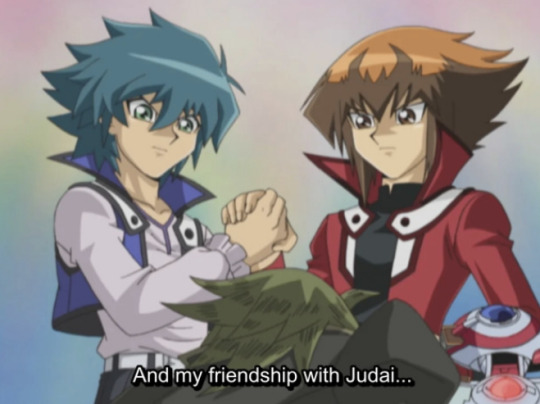
My opinion on Johan is I love him lots. The only reason I didn't include him on my previous season 3 posts is that there's so much to talk about with Johan he basically requires his own post. Johan is just as important to Judai's development in season 3 as Yubel, both alchemically and thematically.
So let's embark on another long, long post for Johan and his role in the story.
The Golden Shadow
Before we deep dive into alchemy let's talk about Jung. Jung's theories of analytical psychology is heavily based on Alchemy so this is relevant, I promise. Freud and his contemporary Jung both pioneered the field of psychology together, however Jung went deeper and believed that re-occuring character archetypes and motifs in stories told us something about the human subconscious itself.
For Carl Cung, "the rediscovery of the principles of alchemy came to be an important part of my work as a pioneer of psychology". Jung linked the steps of alchemy several a process of turning lead into gold as a metaphor for individuation.
Individuation is essentially becoming one's self. Jung believed for a person to be whole, they had to integrate all the parts of their personality. His model divided personality into the the persona (the face / exteral world) shadow (the internal / the subcosnscious where everything's hidden), and the anima and animus made of feminine and masculine traits.
In a show like Yu-Gi-Oh GX, individuation is the process of growing up. Jung used alchemy as a metaphor for a developing person's ego maturing, each stage representing a different aspect of his divided conscious. Nigredo is where we become aware of our shadows, Albedo refers to the anima and animus, citrinatis is where sophia the wise old man or women appears, and rubedo is where the self becomes whole.
Johan however, represents two concepts I've left out. Sometimes alchemy is not four stages, but rather five.
The fifth stage is the Peacock's tail, which appears when a person receives a flash of inspiration. Unlike other stages of alchemy associated with color, Peacock's Tail is referred to as the prismatic stage, associated with the colors of the rainbow. The connection to Johan who's signature card is the Rainbow Dragon is obvious.
More on the prismatic phase in the second half of this power however. For now all you need to know that like the star card in Tarot, Johan is a dazzling light of inspiration that helps kickstart Judai's development. The way he does this is by giving Judai someone to aspire to be like.
If the process of aclhemy is to create gold and become your best self then Johan is the golden shadow, to Judai. His role in the story is to help guide Judai into being his best self.
While the shadow is made up of parts of ourselves we hide from others, sometimes these are positive qualities. For example, a character with low self-esteem like Sho Marufuji constantly put himself down and therefore he's never able to see his good qualities because all he ever focuses on is how he's lackluster in comparison to his brother.
If Yubel represents the worst of Judai's flaws that he must learn to accept so he can learn to love himself in spite of those flaws, Johan represents the best in Judai. While Judai has many flaws that are glossed over in the first two parts of the show, I'd also argue he doesn't experience any positive growth. He's entirely stagnant as a character, which is why I say the opening to season 3 and the immediate introduction of Johan is what kickstarts his development.
The banner image I used for this post is where Judai and Johan are doing the Yu-Jo pose, a card in the TCG that is a reference to the friendship between Yugi and Joey in the original series.
However, I would argue that their roles are flipped. In spite of being the main character Judai is Joey, and Johan is Yugi. It's Yugi who makes Judai develop into both a better friend and duelist as a result of their friendship, to the point where Judai almost became too codependent on him and had to learn to separate himself from Yugi and develop on his own in Battle City arc.
(Hint hint, Judai and Johan will follow almost this exact same arc).
Yugi is the light which guides Joey into betterig himself, and Johan is the light that guides Judai.
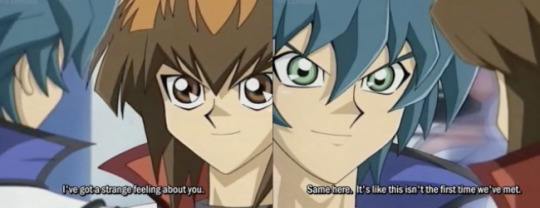
Judai and Johan from their first meeting, get the vague sense they've already met before. Since this is Yu-Gi-Oh the immediate assumptio would be they had some kind of relationship in a past life, but plot twist it's Yubel.
However, I think this red herring is still important because despite the constant comparisons Johan is more similar to Yubel, then they are to Judai.
Edo refers to them both as Duel-Bakas, Shou gets jealous that Judai and Johan spend constant time together after meeting, in everyone else's even probably Judai's they're the same but if you look at their actions as audience members they're quite different. The comparison between them shows the many ways in which Judai is lacking.
Johan is basically Judai, but better. Judai is put on a pedestal by all his friends and seen as a classic hot-blooded shonen protagonist. Johan however, is the one who has all the classic traits of a real shonen protagonist, including having a dream to aspire to, and also fighting to protect his friends.
These are the two most important traits established from basically the first episode with Johan.
Strong bonds
A reason to fight
Johan's personality is more complicated than that, but these two traits are the most important because they're things Judai is lacking in.
Judai is someone is defined by his friendless background, and had no friends until his first year of Duel Academy. Which is why it makes perfect sense that while Judai is in love with the idea of having friends, he doesn't quite understand what a healthy friendship looks like. Judai is also someone who lacks a reason for dueling and only cites he does it for fun and his own personal satisfaction.
Arguably Judai is forced into duels with greater stakes in seasons 1 and 2, but the key word there is forced. Judai is always pushed into those situations, either because his friends aren't strong enough to duel, or his friends actively expect them to fight their battles in their personal lives for him (cough, cough, Sho). In other words he duels for two reasons, either personal satisfaction, or carrying the burdens of others because that's the way he keeps his friends around him.
Judai is ruthlessly criticized for both of these in season 3, the stakes of dueling become too high and Judai just crumbles under the pressure of having to duel for everyone else. As a result his friendships which were never that stable to begin with fall apart.
Johan on the other hand has a goal on his own, and while he might be a tad overprotective of Judai he's also able to coordinate with the rest of the group. In fact when the whole school is teleported to the other dimmension, it's Johan who steps up to lead, while if you notice Judai's actions he splits off from the group repeatedly. Johan's actions are also the reason they are able to return home, because Judai was unable to do anything substantial to defeat Yubel.
One of Johan's first interactions with Judai is him pointing out how callous Judai can be towards his friend, something which others would usually brush aside.
Sho: Bro… I thought you would have something to say to me.
Johan: He seems lost. I think he just wanted you to give him some advice.
Judai: Sho will be fine.
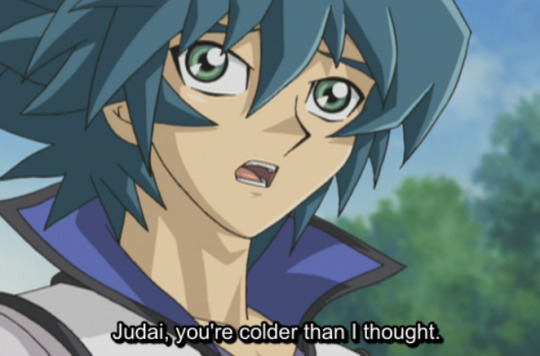
More importantly Joha can notice these flaws about Judai and immediately point them out and confront them about him, while still remaining friends with him on the whole.
Johan is Judai's model for a positive friendship. In comparison the friendships he has with other people crumble because of inability for both sides to communicate.
When Judai and his friends travel together to another dimmesion, Judai is selfish in constantly disregarding others feelings and running ahead, and at points even lying to them and going against plans they all made together. However, Judai's friends are unable to confront him about these issues and instead mostly talk and complain among themselves behind his back. Judai might not have listened in his state of mind, but they don't even make the attempt.
In fact the friends who do try to confront Judai about his behavior are August and Jim, characters Judai has known just about as long as Johan in comparison to friends he's had for two years who don't feel comfortable having a basic confrontation with him.
Judai's friendships suffer from the fact that none of them are truly equal. Sho for example is the first person Judai meets on the island and the one who he's known the longest, but one of their first interactions is Judai expressig discomfort for the fact Sho calls him his older brother because he wants duelist to be equals and Sho just ignoring him and continuing to call him that.
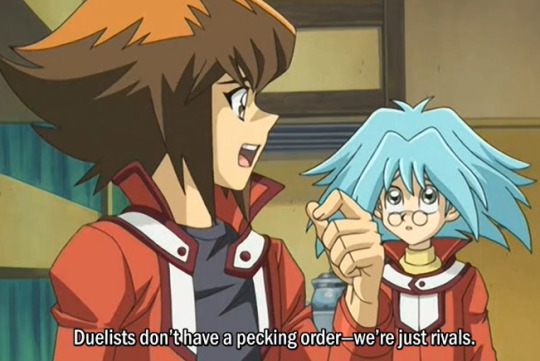
Once again I believe there is problems on both ends, Judai is very selfish and has a tendency to be ignorant of other people's feelings. On the other hand, Judai's friends eventually get in the habit of expecting him to solve their problems because they've built up the idea of him in their minds as the group hero.
As I said the friendship crumbles from both ends in season 3, part of it is Judai being selfish and acting like he's the only person that matters, part of it is his friends ruthlessly criticizing him because he's failing to live up to the image they've constructed for themselves.
Judai's friendships are fundamentally unequal but Judai himself isn't aware of this because he has no idea what a healthy friendship looks like - until he meets Johan.
Johan is a character not introduced to us in season 3, and yet it's very understandable to the audience that Judai would become so obsessed with saving someone he's known for about a month, to the point where he risks the lives of friends he's known for two years. Because that month has given Judai his first taste of what true friendship is like, rather than the idea of friendship he's been chasing.
Johan is Judai's better half in a lot of ways. One example we're introduced to immediately upon his introduction is Johan's role as someone able to see duel spirits, and his strong relationship with his cards. Just as an example, all of Johan's cards regularly talk to him and Johan even refers to them as the closest thing he has to family.
Judai until that point had a spirit partner that doesn't talk, and his heroes and neo-spacians are more like allies. For Judai the Neo-Spacians are allies in his fight against the Light of Destructio, for Johan the Crystal Beasts are his family.
Johan is also far more experienced as someone who can see duel spirits, while Judai is actively repressing the memory of the fact he could see spirits much earlier in life, and of Yubel.
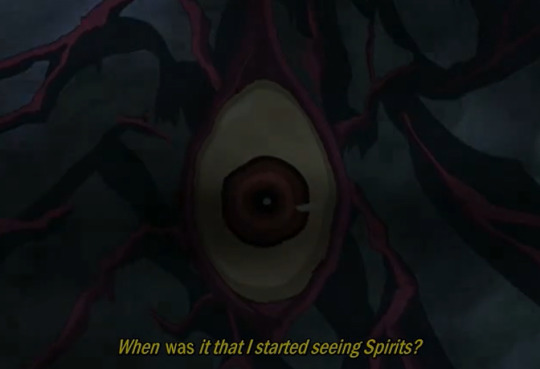
Before the characters even travel to another dimmension, Johans duel against the spirit hunter Giesse demonstrates how Judai is lacking in these two traits, strong bonds, and a reason to fight. It also demonstrates the difference between how Judai and Johan regard their spirit partners, and why Johan's relationship with his cards is better.
Shortly before the duel even begins Judai is pushed to the brink by his previous duel against the teacher. A duel that not only exhausted him, but also deeply disturbed him because the teacher called into question his lack of reason for dueling and Judai had no real response. When Judai questions himself he does something we don't often see him do, he goes to someone else for advice. J
udai basically never lets himself appear insecure or lost around friends who aren't named Johan. Judai even apologizes to Johan for asking something out of the blue, he's so unused to relying on others for emotional support of any kind.
Judai: Johan what have you been dueling for? See, it's about fun for me... Well, for the surprise and happiness too. I guess I do do it for the fun. Sorry, I guess I put you on the spot by asking out of nowhere.
Johan: What's this about Judai?
Judai: It's nothing.
Johan: I suppose there is one goal I have.
Johan: Even if someone doesn't have the power to see spirits, they can still form a bond with a spirit. That's why I do it for people like him.
Johan wants to be a bridge between humans and spirits. Not only is Johan a character defined by the strong bonds of friendship he forms, but his life's goal is also built around improving the bond between spirits ad humans.
Immediately afterwards, Judai gets up and struggles to duel against their next foe. However, this time Johan steps up to duel in Judai's place, which is also a drastic change from Judai's other friends. Unless they had a strong personal bond like Fubuki and Sho with Ryo, Judai has stepped up to handle all the major duels since Season 2. Judai even experiences anxiety over letting Johan go and duel in his place.
Johan is introduced to Giess the hunter, a spirit hunter who actively found a way to kill spirits. A character like that seems like Johan's obvious narrative foil. Giess even invites the comparison between the two of them, saying that Johan is obsession with getting his hands on Rainbow Dragon is similar to how he hunts spirits.
However, Giess works much better as a negative foil, or shadow of Judai. Which is why it makes sense Johan is the one who duels him, because he represents the best in Judai while Giess represents the worst.
Now the question is how could Giess possibly be compared to Judai? Yes, as I demonstrated above Judai is much more inexperienced with seeing spirits than Johan is but he's never actively malicious towards them the way Giess is.
Except, you know when he slaughters hundreds of duel spirits after turning into Haou the Supreme King.
Giesse has a final monologue upon his defeat, to explain why he does what he does and his cruelty towards spirits. Giesse who has probably been able to see spirits as long as Johan once formed a strong bond with a duel spirit, but he was separated from that spirit. The pain made him close his heart off to forming bonds with any other spirits.
After losing his duel spirit partner he came to conclude it was impossible for humans and duel spirits to get along, because the spirits are too pure hearted to understand humans.
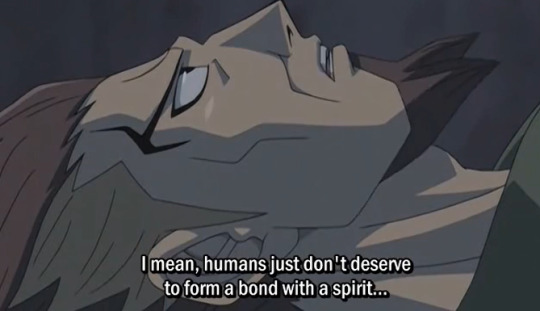
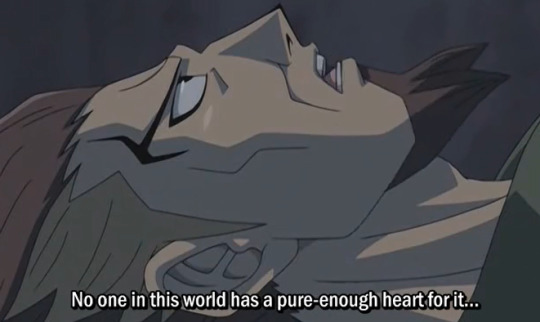
Giesse foreshadows Judai's downfall and his actions as the supreme king. Giesse's start of darkness was being forcibly separated from his spirit partner. The entire conflict from Season 3 happens because Judai made the choice to send his childhood friend / spirit partner Yubel into space.
Ironically, despite Yubel beig corrupted by a force called the Light of Destruction, and having a very twisted, sadomasochistic view of love I think Giesse's words here describe why Judai and Yubel can't understand each other.
Yubel is in a way too pure hearted.
We're never given a reason why Yubel became so overprotective of Judai in childhood before they ever became corrupted by the Light of Destruction but we know one thing for sure.
Yubel has no understanding what they did was wrong. They saw themselves as doing their job of protecting Judai which they sacrificed their body for in the past life. They neither understand why Judai was upset by their actions, or why Judai was upset when people started avoiding him because for Yubel being alone with Judai was enough for them.
It makes sense that Yubel wouldn't understand that Judai wants to have friendships with other children his own age. After all Yubel is a spirit that can only be seen by Judai. For Yubel, there is only Judai, they can't communicate with others, they can't form other friendships. Which is extra tragic if you remember that Yubel wasn't born a duel spirit but a personhood, and gave up their very personhood for Judai.
Yubel is very pure-hearted in a way that's almost insidious, they are so straightforward about their love for Judai, and they exist solely for Judai's sake that they can't understand why Judai has room for other people in his life, because there's no one else for Yubel.
The conflict in season 3 comes from Judai's decision to abandon Yubel. Judai can't come to an understanding with Yubel because Yubel is too pure, being a duel spirit that only exists for Judai's sake.
Judai also follows a similiar path to Giesse, when he loses Johan along with the rest of his friends Judai makes the decision to give up on the notion of love in order to gain power instead.
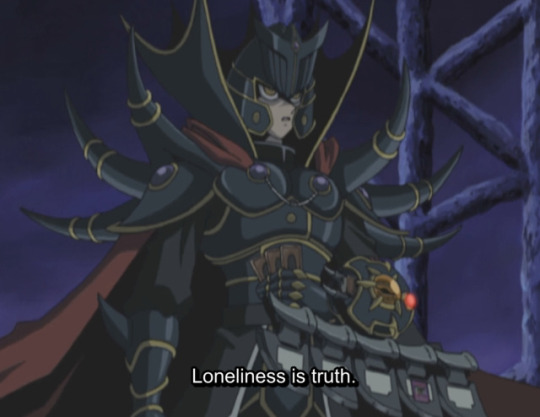
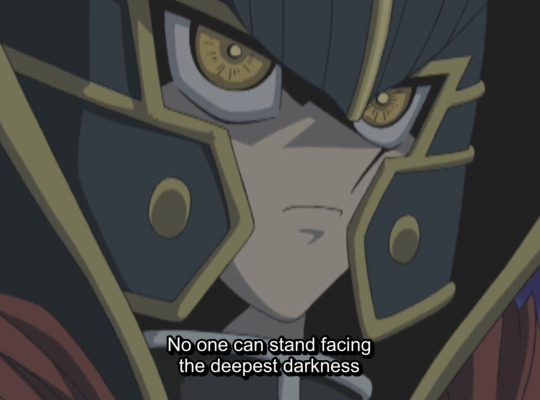
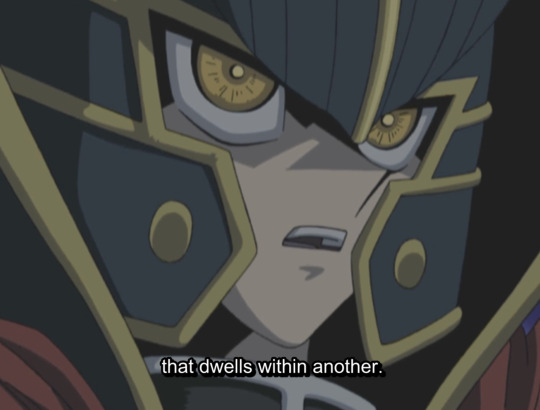
This is quickly followed by him killing duel spirits en masse, probably more than Giesse managed to kill in order to sacrifice them to forge a powerful card. When Johan is battling with Giesse he's literally battling a reflection of the worst part of Judai. Which sets up Johan's role in the series to guide him to his best self.
In summary Johan's relationships with his spirits are strong and healthy, Judai's relationships with Yubel is weak and unhealthy. In fact, Judai is helping achieve his dream of being the bridge between humans and spirits by essentially teaching Judai what strong bonds looks like.
Johan is also symbolically Judai's complementary half in a lot of ways. Each of the new transfer students plays a deck that embodies one elemental step of the stage of alchemy, August is fire / Nigredo, Amon is Water / Albedo, and James Crocodile Crook is Earth / Citrinitas. Johan is the only exception to this rule, because he plays the crystal beasts which are modeled after the seven colors of the rainbow.
Johan is light which puts him into the contrast with Judai who's both set up as the chosen one of the "gentle darkess" to fight the light of destruction, while at the same time someone corrupted by that very darkness into becoming Haou.
Which sets up Johan to contrast to be a pair with Judai. My friend Kaula or @nini-the-mirror pointed out to me we're shown two types of darkness, the destructive darkness embodied by nightshroud and the gentle darkness. While the light of destruction is set up as a destructive force in the universe, there's also Johan's light based crytal beasts, and rainbow dragon which cleanses away darkness. Fusing Rainbow Dragon with Neos purged Yubel from Johan's body, and when Judai was trapped in darkness illusion in Domino City and believed Johan to be Mr. T, it's Johan and the Crystal Beasts who purify him once again.
Johan's desire to be a bridge between spirits and humans, his northern heritage, and Rainbow Dragon all call to mind the Bifrost, a rainbow bridge which connected heaven ad earth.
The bifrost was a connection between the mortal world, and the realm of the gods, or the physical and the spiritual. Just as Johan is a mortal who can talk to spirits. Yu-Gi-Oh GX is also an anime heavily based off of alchemy concepts, and one of the central ones that's even said by Professor Daitokuji himself is: That which is above is like to that which is below, and that which is below is like to that which is above.
It's a phrase written on the Emerald Tablet, often shortened to "As above, so below." It means the mortal world effects the world of the cosmos, and the world of the cosmos effects the mortal world because everything is connected.
By wanting to stregthen the bonds between humans to spirits Johan is basically embodying this phrase. Judai's goal as the alchemist is to be the one to make changes in the mortal world that affect the cosmos. For example, his battles on earth against Saiou has a direct effect on stopping the Light of Destruction, but honestly again Johan serves his role a lot better than Judai.
Johan is in fact a character written around the concepts of bonds itself, the bonds of humans, the bonds between friends. Judai cares about these things too, he wants to be a good friend, but he has lots of flaws that stunts his growth and holds him back. His inability to integrate his shadow also presents him from being his best self (the golden shadow).
To quote my friend Psyche:
"The shadow is basically the storehouse of everything you don’t like about yourself. The things that others are but you could never allow yourself to be. But it’s also the storehouse of the alchemical gold."
Not only is Johan the best parts of Judai by being his golden shadow, he's also essentially Judai's goal. Judai wants to be like Johan.
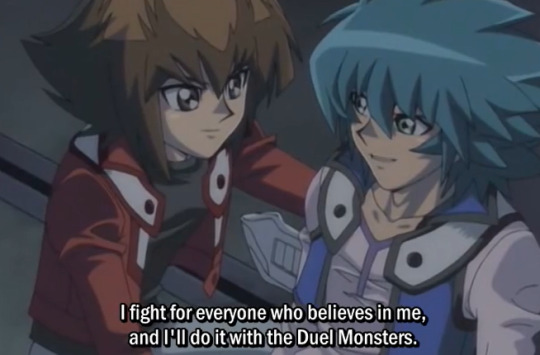
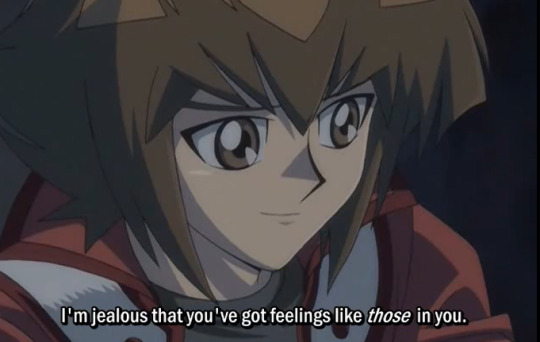
If Johan gives Judai these things he's lacking, a healthy friendship, and a reason for fighting, then problem solved right? All Judai needs to do is marry Johan.
If you can't tell I was being sarcastic.
The Prismatic Phase
Alchemy is a process of refinement, of breaking down and forging into something stronger. However, when the metal starts out it's full of impurities that need to be hammered out. Alchemy is often used as a metaphor for both character growth and developing relationships in stories, after all if a character starts out perfect there's no story.
I said above multiple times Johan exists to demonstrate to Judai what a healthy friendship is to Judai. However, the attachment that Judai forms with Johan is anything but. Albeit for different reasons than the rest of his friends.
Johan is indeed someone who is set up as Judai's equal, and also strives to be his support rather than constantly relying on him for battles. Johan doesn't just exist to be a good friend to Judai however, he also demonstrates leadership skills Judai doesn't have when faced with a school full of hungry students teleported to another dimensions.
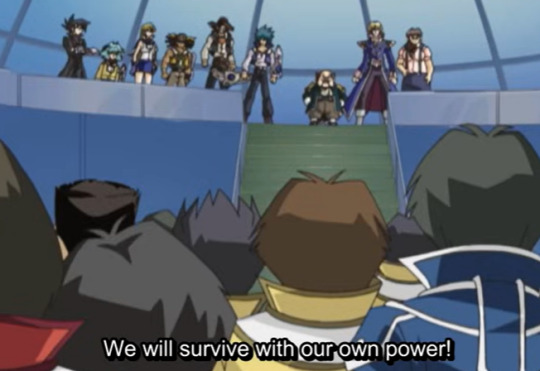
The problem is on Judai's end. Judai definitely needed a friend like Johan, because he's never experienced a friendship between equals before. However Judai as inexperienced as friendship as he is takes this openly supportive friend and starts using him as a crutch.
There's one scene in particular that demonstrates this problem. In the leadup to the cobra duel, Judai confided in Johan twice that he doesn't have any real reason for dueling and he's insecure about that fact. Cobra then criticizes Judai heavily once again for his irresponsible attitude.
Seeing Judai about to crack under the pressure, Johan takes the moment to encourage Judai by reminding him that he has in fact been carrying everyone's responsibilities on his shoulders all along.
Johan: "Why are you so scared Judai? You think there's nothing riding on you? Quit messing around. You've always had everyone's hopes on you. Anyone who's being counted on'll have people putting all their hopes on him. Isn't that what you're always burdened with. What will happen to us all if you lose?"
Well-meaning advice from Johan, but wrong for Judai for two reasons. The first is that Judai's reasons for fighting are something he has to think through for himself. That's how character development happens. Judai can't solve this inner conflict by having Johan just show up and drop the answer in his lap. He still hasn't thought about what he wants to be, he's just accepted Johan's words at face value.
The second is that Judai taking on other people's burdens is precisely the problem. Johan is such a self-reliant person he can give his support to other people without tiring himself out, but Judai can't. Johan wants to protect his friends. Judai duels for his friends because he's absolutely terrified of losing his friends, that's the difference.
Judai's not mature enough to handle other people's burdens and eventually the pressure gets to him and he completely cracks. Judai's just not mature enough to have a healthy relationship with Johan in general.
A relationship where being separated causes one person to have a complete emotional breakdown is not a healthy relationship.
In fact Judai completely ignoring all of his friends after a separating from Judai, and wanting to get him back ad being willing to sacrifice anything for that goal is a parallel to Yubel. Yubel is also someone who was separated from their best friend who they emotionally depended on, and stopped caring about anything but said friend, and was willing to sacrifice everything to reunite with them.
You could liken the disappearance of Johan, and the subsequent rising of Judai as the Supreme King as propelling him through the black phase of alchemy Nigredo, where the soul is brought to its lowest point and the worst flaws are revealed.
In the second sense, "the nigredo of the process of individuation on the other hand is a subjectively experienced process brought about by the subject's painful, growing awareness of his shadow aspects. It could be described as a moment of maximum despair, that is a prerequisite to personal development Here is "the darkest time, the time of despair, disillusionment, envious attacks...Nigredo, the blackening" [Source]
Johan's friendship is important to Judai, but his union with Johan doesn't actually fix any of Judai's problems and aggravates them in some ways. Judai doesn't even start improving as a character until after they seperate.
Johan isn't the rubedo the end result of alchemy, he's the pristmatic phase, the shining light of inspiration.
One metaphor I like to use for the Prismatic phase is the Star in the fool's journey. GX references Tarot and the fool's journey too, and like alchemy it's also a metaphor for personal growth. The fool (Judai) a person brimming with infinite potential, yet one who is also supremely ignorant, walking forward blind has to wise up to the wys of the world.
In the Fool's Journey the Star is a period of brief respite after the disaster of the tower. A beacon of hope and inspiration appears before him.
The Fool is suffused with a serene calm. The beautiful images on the Star (17) attest to this tranquility.Radiant stars shine in a cloudless sky serving as a beacon of hope and inspiration.
The Fool is blessed with a trust that completely replaces the negative energies of the Devil. His faith in himself and the future is restored.
Doesn't this just describe Judai and Johan's first meeting to a T? Johan is supposed to be Judai's guiding light in the story ater all. However, the Star is immediately proceeded by the moon the card of illusions and self doubt.
Just like Judai becomes too reliant on Johan to provide him all the answers, the light of the star makes the fool vulnerable to the illusions of the moon.
What effect could spoil this perfect calm? Is there another challenge for the Fool? In fact, it is his bliss that makes him vulnerable to the illusions of the Moon (18). The Fool's joy is a feeling state. His positive emotions are not yet subject to mental clarity. In his dreamy condition, the Fool is susceptible to fantasy, distortion and a false picture of the truth.
Season 4 even invokes star and moon symbolism in regards to Judai and Johan in a negative light. Fujiwara looking into Johan's heart says that Johan's weakness is Judai himself.
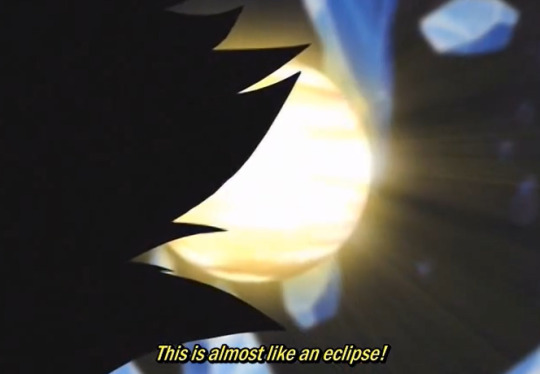
He describes Johan's friendship and fixation on Judai as a moon eclipsing the sun. That's not two opposites balancing each other out that's one obscuring the other.
The season 3 version of their relationship is unhealthy and therefore needs to be broken apart and reformed. That's the process of alchemy, even if Yubel didn't kidnap Johan they probably would have broken apart some other way because Judai was too dependent on Johan.
It's also a violent process that includes Judai needing to duel Johan in a way where they are both inflicting pain on each other in order to purify Johan of Yubel's control. Yubel and Fujiwara both comment that underneath it all Johan desires a violent conflict with Judai. Which is probably something that would be explored more if Season 4 was longer. My interpretation however is that Johan being who he is, is kind of forced into the role of caretaker when Judai is involved as Judai is often in need of taking care of. That probably produces darker feelings for a change in their relationship.
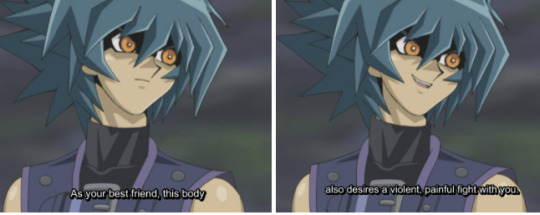
The opposite of unions is a violent process that requires dissolving your previous self. The dictionary of Alchemical Imagery defines it as-
one of the central images of the opus alchymicum and a crucial operation in the creation of the philosopher’s stone. The alchemists were ultimately concerned with the union of substances, the reconciliation of opposites. Through the ‘marriage’ of opposites the goal of the opus, the production of gold and its metaphysical equivalent was obtained. (p. 35)
Judai doesn't marry Johan, but they do have their friendship broken apart and reforged again and it's representative of the prismatic stage.
The Peacock's tail which Johan represents is also like the Star in tarot, a stage where a guiding light suddenly appears. One of the Spector Solis plates , Plate 16 - which depictins a Peacock in a flask is a good representation of this stage.
It is a plate of what else but unity.
The unity that began in plate fifteen is fully realized with the encapsulated animal’s transformation into a single-headed being. The peacock tail is a physical stage in alchemy, a brilliant flash of green which comes to signify that the alchemist is one the right path. It can also be recognized in spiritual/psychological alchemy as a flash of visions that come to the adept as they move through the phases of transformation.
The peacock doesn't just appear to guide the young alchemist through the phases of alchemy however, he also guides them spiritually.
Plate sixteen embodies that process, the turning point where the adept reaches a new level of consciousness with a flash of the peacock’s tail.
Consider the words spirit (i.e., the wine), spiritual, and inspiration.
To inspire can mean to breath; it can also mean to transmit fervor. Spirit can be meditative, or evocative.
Who better to provide spiritual guidance to Judai then the person who's goal in life is to become the bridge between humans and spirits.
As the star's dazzling moment of inspiration is just temporary, the plate also emphasizes that the peacock's tail itself isn't the ed of the journey. One of the most significant symbols on the painting is the appearance of three people drinking wine and eating grapes. Three people = three stages of alchemy. As for the rest.
The key to the process of plate sixteen lies in the bottom left-hand corner, with the three people seated at a table, drinking wine and eating grapes. The process of this plate is fermentation. Grapes must be crushed and destroyed to create sweet intoxicating wine. The grapes are perfect as they are, but by destroying them we can make something higher, something that can alter consciousness.
Judai has a nice, comfortable, supportive friedship with Johan but he's the one receiving most of the support. By destroying that relationship, he's able to make a healthier one. Ironically it's the separation from Johan that teaches Judai how to exist apart from him.
In that sense Judai's character development revolves around two figures in season 3, two important relationships, Judai needs toto reunite with Yubel, and he needs to separate from Johan after quickly becoming too codependent.
The three of them together even form an alchemical trio. Often works featuring alchemy symbolism will divide characters into three different roles, the soul (anima), the spirit (spiritus) and the body (corpus). Symbolic of three parts of one whole person. The main characters of a work are often symbolically marked as one of the three.
The classic symbolism of alchemy is the circle, the triangle representing soul spirit and body, the square that repreents the four elements, the small circle, and the man and woman which form the rebis.
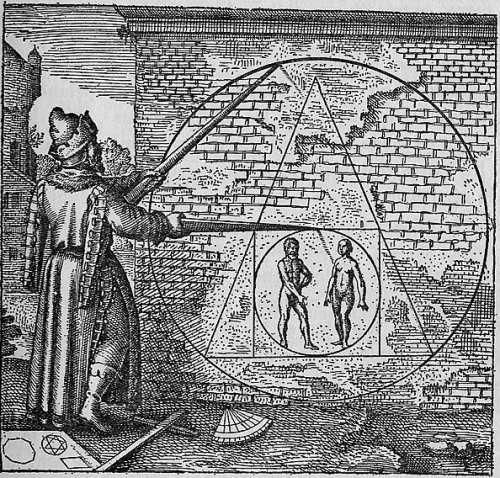
The triangle is what we're talking about here, in terms of marking characters to Soul, Spirit and Body. Though, another variation is Mind, Heart, and Body.
Most commonly, authors mark their male protagonist, the Male Principle of the Work, as heart and their female protagonist, the Female Principle of the Work, as mind. If they have a companion, he or it will be marked as Body. If you look back at the Mundus Elementaris that I just posted you’ll see that Sun corresponds to Cor (heart) and Moon to Cerebrum (brain).
The characteristics of a “heart” character are pretty much what you’d expect: courage, self-sacrifice, occasional rashness and impulsivity.
The characteristics of a “mind” character are if anything even more obvious. “Mind” characters are knowledgeable, book-smart, and sometimes overly cautious.
What about the Body character? There isn’t one in every alchemy story, but when this does appear, the markers are predictable. Body characters are focused on their bodily needs–they are hungry, thirsty, and, in adult stories, lusty. And they are often fearful. [SOURCE]
In this case in a slight difference from the norm, I'd argue that Judai is the heart, Yubel is the mind, and rather than body Johan represents spirit.
The three of them essentially make up the trio of Judai's two most important relationships. Judai is a part of other groups, because GX has a ensemble cast. In seasons 1 and 2 he mainly hangs out in a trio of Sho, Hayato and him, and in season 2 it's Sho, Kenzan and him. Season 4 kinds of marks Judai, Asuka, Sho and Manjoume as the most important students of the graduating class.
However, the characters that influence Judai the most are Yubel and Johan. Johan is the spiritual ispiration, while Yubel is first a challenge for Judai to wise up and grow up, and eventually settles down into a role of advisor like Astral or Yami Yugi.
The main character trio of Season 3 onward are essentially Judai, Johan and Yubel, and each are critical to each other's growth. All three also participate in the final duel against season 3's villain. Judai and Johan tag team darkness possessed Fujiwara, and Judai and Yubel fight nightshroud.
However, as I mentioned above the way these relationships develop Judai are opposites, one of them needs to unite, the other needs to split.
A lot of people draw parallels to Yubel and Ai, the ally turned final villain of Vrains. Ai is also motivated by love and a desire to protect Yusaku the main character and object of their affections. However, the greatest point of comparison is that the option of fusing themselves together, an obvious call back to super polymerization is brought up by Ai in order to be flatly turned down by Yusaku.
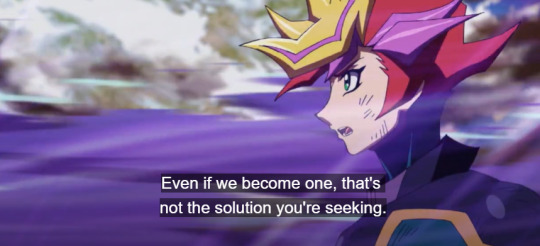
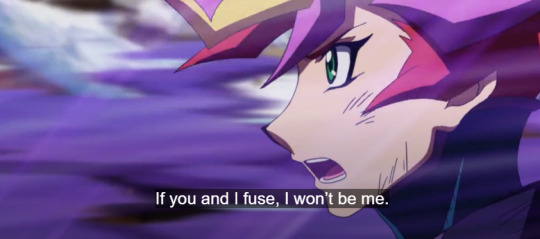
And you won't be you.
The parallel to Judai and Johan is not as obvious here, but think about it Judai is his absolute worst self when he's willing to sacrifice anything just for the chance of having Johan back
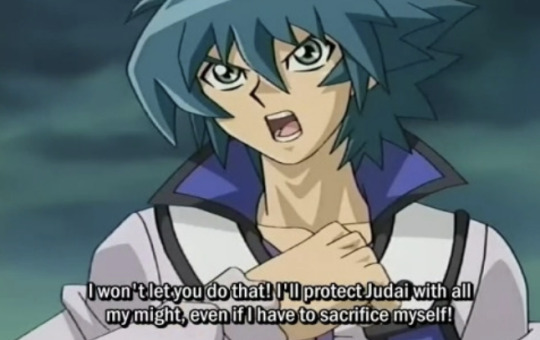
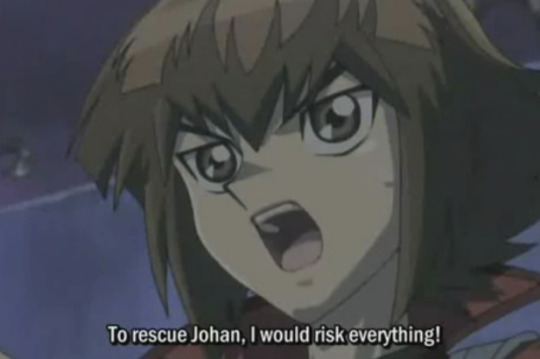
Okay but just look at how different the two are. Both Johan and Judai, when put in very similar situations (having to save someone), tell us what they’re willing to risk for that goal. They’re both very clear about that.
Johan is willing to risk himself.
Judai is willing to risk everything else. [Source]
Judai become so destructive in his path to get Johan back, including slaughterig duel spirits en masse, somethig the self appointed protect of duel spirits Johan would absolutely hate that you have to wonder if his desire to have Johan back is even about Johan.
Judai doesn't have much respect for Johan's agency as an individual. It's normal for Judai to be sad, or even to have survivor's guilt when he thinks Johan is dead because he sacrificed his life to save him.
However, Johan didn't sacrifice his life to save just Judai but everyone else. Johan also made the choice to sacrifice himself so Judai would be safe. Judai's response to that choice is to immediately throw not only himself but his friends into repeated danger in order to rescue Johan, and then when all hope is lost start hurting spirits.
Judai doesn't respect fact that Johan wouldn't be happy with Judai hurtig himself or others, especially spirits, because rescuing Johan was never about Johan, but Judai's own feelings of grief.
Juudai is a deeply flawed protagonist. He’s more selfish than any other protagonist this franchise has ever known. The way he goes after both after Johan in season three and O’Brien shows that he actually doesn’t care all that much for them as people. To him, they represent a concept: Victory, or at the very least atonement for his past actions. A convenient way to right what he did wrong.
That is not to say that he doesn’t like them as people - he does. But when the chips are down, what he ultimately wanted was a chance to redeem himself by saving them. [Source]
Yubel and Judai are opposites who need to be united and learn to live with each other. The crux of Judai and Johan's problem is that really they're so similiar that everyone, including Judai sort of sees them as the same perso. However, as stated above just underneath the surface they have a lot of differences that could lead them to an unhealthy relationship. Judai just like Ai needs to learn that Johan is a separate person from him.
Which is why Judai's greatest two character development moments with Johan come not from the moment where he fuses rainbow dragon with Neos for the first time to cleanse Judai's body from Yubel.
It's actually immediately afterwards, when Johan hands Judai his deck to face Yubel. While Judai also makes the decision to face Yubel alone.
The arc theoretically could have ended right there. Judai's objective was to save Johan, and Johan was saved. Except the real conflict of the arc was that Judai needed to learn to take responsibility for himself, instead of leaning on a convenient crutch like Johan.
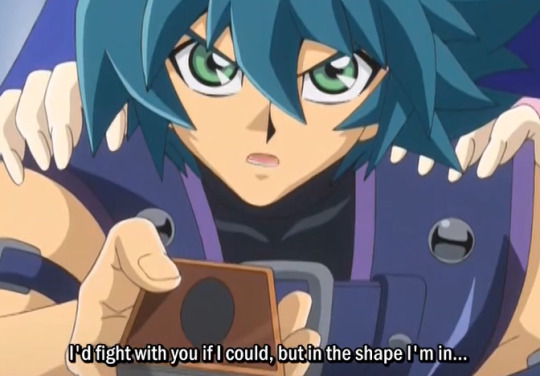
In Yu-Gi-Oh a duelists deck is often referred to as their soul, so Johan is entrusting Judai with a lot. That simple action really shows Judai that Johan can support him even from a distance and the two don't need to be attached at the hip.
In the tag duel against Fujiwara, Johan makes a similiar decision of sacrificing himself in order to protect Judai. However, to show how much he's changed since season 3, this time Judai does't completely lose his mind over Johan's sacrifice and respects Johan's feelings instead. Johan doesn't want Judai to fall apart, he wants Judai to carry his feelings with him and finish the duel for both of them and that's what he does. Judai has learned now to accept support without completely turning Johan into a crutch.
Citriniatis is also the third stage of alchemy. Each Season of the four seasos Yu-Gi-Oh Gx represents one of the four stages of alchemy.
The third stage is often referred to as the stage where the light which appears in albedo starts to shine.
Seperation from Johan essentially kicked off Judai's blackening stage, waking up his shadow in the form of the supreme king and bringing light to his flaws. This passage in particular describes it as a "rising sun" and "bringing light to consciousness."
In most cases Jung himself expressed the work as having three stages. Still, citrinitas seems to fit better into a flow of growth and development, as well as mystical progress as the third stage. In the second stage, albedo, a light appears in the nigredo darkness, the light of an awakened soul which is symbolised as a moon (the feminine) shining in the darkness. The third stage, citrinitas, brings forth the light of the sun (the masculine), a light which magically transforms the shadowy and fearful subconscious into valuable consciousness. From the dark night of rubedo, to the pale morning light of albedo, the sun rises in citrinitas to the culmination of day in rubedo. [Source]
Johan is simulatenously a light which shines on Judai's worst flaws just by being his better self and showing how selfish Judai is in comparison, while at the same time he's also the light that guides Judai on the path of healing.
After all Judai's final action in Season 3 isn't to kill Yubel like the Supreme King, or like a hero would, but rather to reconcile with Yubel. That's a path Johan would have taken considering Johan's whole goal is to help lost spirits like Yubel repair their relationships with humans.
Judai's journey of atonement even takes a similiar path to Johan, and mirrors Johan's dream of becoming the bridge between humans ad spirits. Unlike the duel between Cobra and Judai though, I don't think in this case it's Judai relying on Johan to give him the answers in life.
This is because the two of them have entirely different reasons for wanting to help spirits. Johan wants to help spirits because the strong connections he feels with spirits, and the crystal beasts in particular give him the only sense of family he's ever known. It's also because of an encounter with a little boy who lost his Jerry Beans Man where he came to understand that even people who can't see card spirits still feel a strog bond with them.
Judai however has an entirely different motivation, his journey to help duels spirits is a journey of atonement. It's also one he's taking together with Yubel because they both have a lot to make up for and a lot of healing to do.
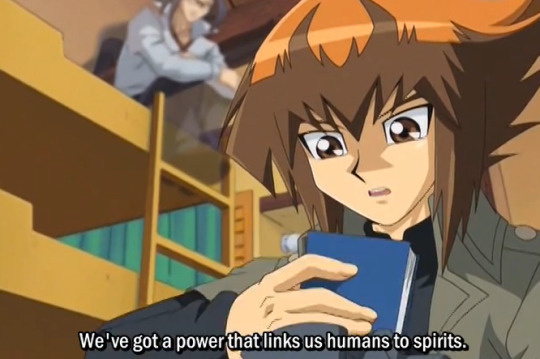
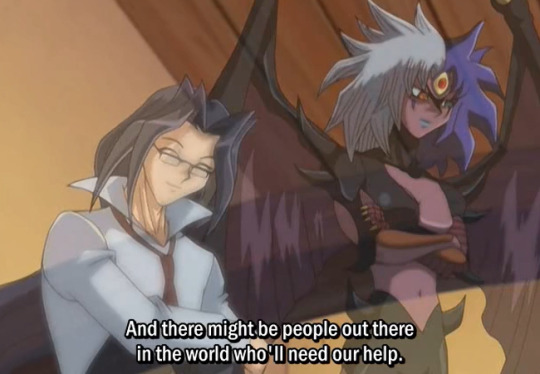
Judai also didn't start out Season 4 wantig to become the bridge between humans and spirits. In fact he spent most of season 4 sitting alone in his dorm being depressed and aimless. It's his confrontation with Fujiwara, and his act of helping Honest reunite with his spirit partner Fujiwara that gave Judai the idea that he could help heal other spirits too.
Following the motto of dissolve et coagula, dissolve and coagulate all the troubles and tribulations and even the separation of Season 3 was necessary for the much healthier bond between them in Season 4.
Judai doesn't even say goodbye to Johan at the end of the season, and he leaves without telling Johan where he's going, but essentially they are still walking the same path of uniting spirits and humans and it's a path Judai would have never found without Johan's help.
#ygo meta#johan andersen#judai yuki#yubel#yu gi oh gx#yu-gi-oh gx#yu gi oh analysis#spiritshipping#alchemy
63 notes
·
View notes
Text

#I don't feel my thumbs#I'm sorry to all those people who I gave a boop to and they didn't even know who I am#anyway#Follow me for more stupid memes and Yu-Gi-Oh analysis#and headcanons#just kidding#boop#gravity falls#meme#april fool's day
2K notes
·
View notes
Text
A Trapezoid of Foils: Judai/Yubel and Amon/Echo

I'm back on my bullshit, and my bullshit is yelling about the trashfire that is Judai Yuki and Yubel. This post is a collection of thoughts on how Amon and Echo were clearly meant to reflect Judai and Yubel in some way or other, and how it feels like it should be neater than it is. The parallels are there, but it's not fully symmetrical and some of the angles are kind of weird...so yeah, kind of like a (non-isosceles) trapezoid!
(Geometry Tumblr do not @ me, I'm doing my best with this metaphor)
Spoilers for GX season 3, naturally. I haven't said it before, but for this post as well as previous ones I'm basing all information and characterization on the sub version of GX rather than the dub (which drastically changes Yubel's backstory and motives).
Yubel and Amon
This is the most obvious one, because Yubel spends two whole episodes and honestly some of their most iconic monologues trying to tear Amon down after building him up the whole season.

They're both antagonists willing to cause harm to the one they love for their goals. For Amon, that goal is the power to build a utopia. For Yubel, the harm is the goal - or at least, the metric by which they will have achieved their goal (showing their love for Judai).
Yubel, of course, claims that Amon is more selfish in his use of harm. Pain is love in their philosophy, but it's mutual pain - dishing out the pain without taking any back would only be mere cruelty. This of course misses the nuance that Echo wanted Amon to use her as a sacrifice, while Judai didn't welcome any of Yubel's twisted affections.
Still, from what I've seen most people agree that Yubel comes across as more "honest" one way or another. And to understand why things feel that way, it's important to look at their backstory and motivations, as well as how their motivations change.
Yubel dedicated themself to Judai's past life, tying themself to him through lifetimes, and in the present remained true to that devotion in unwanted ways. When Judai sent them to space and it ended up being Oops! All Torture, Yubel developed their sadomasochistic philosophy as a coping mechanism and an attempt to reconcile Judai's past promises and present actions.
Upon their return to Earth, they planned to return the "favor": by sending Yubel to the pain and isolation of outer space Judai made them stronger (i.e., infected by the Light of Destruction, with all that entails), so they'll give him his own painful experience (all of season 3) to make him stronger (awaken his power as Supreme King). Then they'll reunite, having both demonstrated their love for each other, and [this part is where the Light of Destruction really twists up their thinking]. Everything they do is in the name of this motive*, whether Judai really likes it or not.
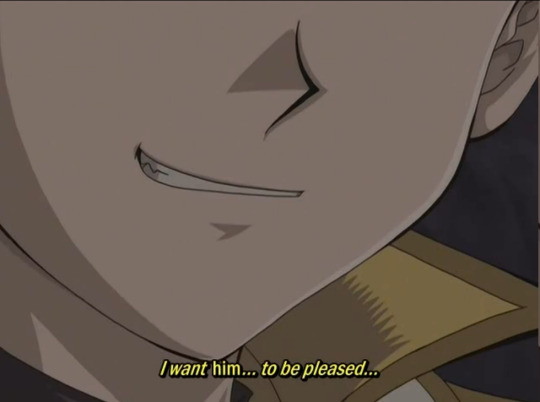
Amon dedicated himself to the Garam conglomerate with Echo by his side before being replaced by his younger brother Sid, the sole blood Garam sibling. He nearly murdered Sid before changing his mind and dedicating himself wholly to his brother instead, a decision Echo and Yubel both describe as willingly chaining himself to their service. Even when given an opportunity to become the heir (all it'd take is watching his brother die to illness, not even murder) he rejects it, and begs for a way to save him.

And yet, when when given the opportunity he made a deal with the devil to break the chains he put on himself and abandon that same family. Then when he gets the chance to obtain power by sacrificing someone he loves, he does exactly that. Then he plans to become king of a utopia free of suffering, and always remember Echo.
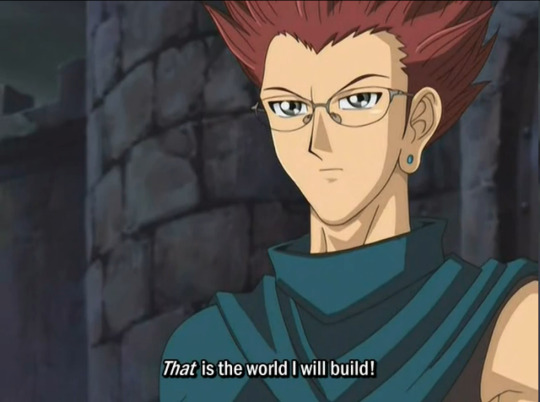
So then, what are Amon's motives? Is he somebody who got tired of being abandoned or unappreciated? An ends-justify-the-means idealist? Just a power-hungry hypocrite? It's hard to tease out a consistent character and ideology from him. And in a show where people wear their hearts in their decks, I think this part of why people hate him - and so does Yubel.
Yubel hates Johan because he's terrifyingly like Yubel in some ways, focused and protective and dear to Judai.** Yubel hates Amon because he can't be like Yubel at all, resenting the brother he dedicated himself to and sacrificing the person he loved for power in an empty world forever devoid of that same person.

No way Yubel can be that kind of person, right? Otherwise, what was it all for?
* To be fair, you don't know all of Yubel's backstory by the time of their final duel with Amon. However, even removing the context of their past life that duel together with Yubel!Johan vs. Hell Kaiser establishes Yubel's central motivations more coherently than they do Amon's.
** Help, I know there's been other essay segments on this topic, text and video alike. But I saw a lot of them back in early 2023 when I was mindlessly going through GX material in a haze of hyperfixation and now I've forgotten all the other good sources.
Yubel and Echo
If Yubel's parallels with Amon are about their dedication, Yubel's parallels with Echo are about who they're dedicated to. Both believe in their loved one's destiny to become a king, and take actions to make them that king.
Yubel has historical basis in that Judai is quite literally the Supreme King, bearer of the gentle darkness. To help him achieve that role, Yubel enacts a plot to break Judai until he awakens his Supreme King side. It fits neatly into their schema of things: this is how they make the person they love stronger, so that they will thrive and survive. Make Judai stronger and awaken his old power, and all will be as it was meant to be.
Echo just believes that Amon is amazing enough that he would make a better king than anyone. When the chances arises to help break his chains and give him a world to rule, Echo takes it.
...And boy does she.

Both Yubel and Echo believe their loved ones are meant to be a king. Both give their lives in support of their loved one, and become weapons wielded in their service.
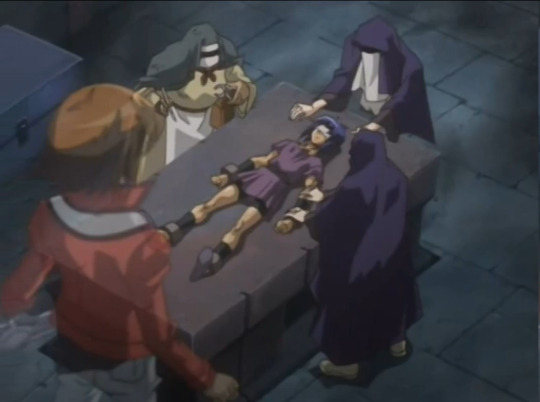
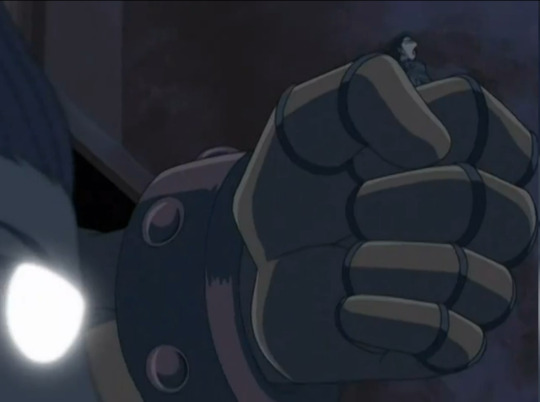
No wonder Yubel was shaken by Echo's devotion remaining within Exodia for just a moment - it's not all that far from their own.

Unfortunately Yubel's only direct interaction with Echo is goading her attack on field-Yubel during the final Amon duel. Otherwise they only speak of Echo as someone used and abandoned by Amon - which in itself has potential, given Yubel's own feelings about Judai sending them away.
I think GX could definitely have explored this connection a bit more. There's space to fill here.
Judai and Amon
As noted above, Judai and Amon both have roles as kings - at least, in the eyes of their single most loyal people. Judai holds the title of Supreme King as the wielder of gentle darkness, and while not confirmed his past life sure looked like a prince. Amon simply has ambition, talent, and an ideal world in his mind.
And in operating with the ambition of kings, they both do terrible things to achieve power. Judai lays this out explicitly in the Edo vs. Amon duel:
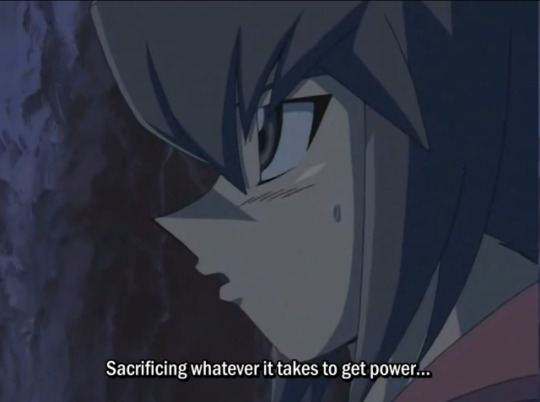

Amon lets his need for power get in the way of his other relationships and priorities, and sacrifices the ones he loves to obtain Exodia similarly to how Judai sacrificed his friends and eventually uncountable innocents for his own goals - finding Johan, and then ruling as Supreme King. Straightforward, right?
But I think there's another parallel between the two that's a lot more interesting. Or...most of a parallel. Namely, their relationship with their other halves and the responsibility of a loyal follower who would give up anything for you, be it their life or their humanity.
What do you do when the person you love most dedicates their existence to you - to the point of throwing everything else away, even their very life?
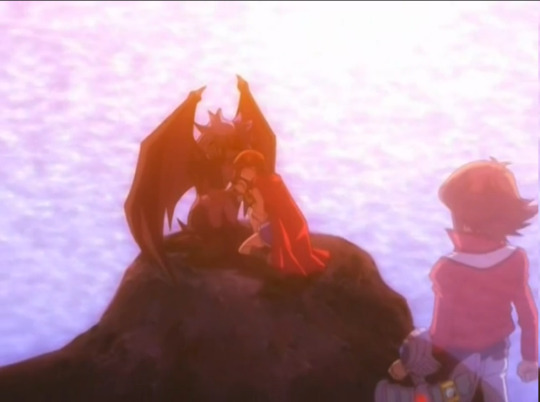
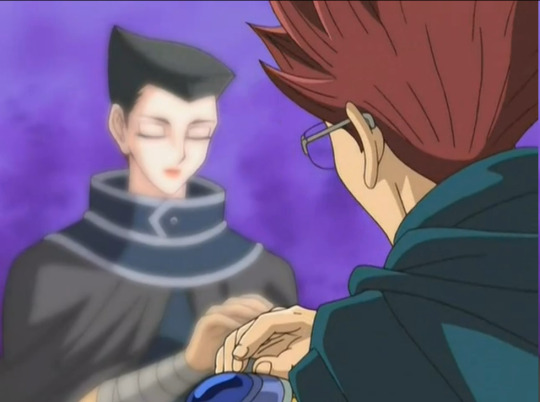
Of course, the Judai-Yubel and Amon-Echo situations aren't exactly the same even putting aside the issue of reincarnation. (For the purposes of this essay I'm not making huge distinctions between Judai and his past life, but if you want to get into the details I've written about that previously.)
Yubel went ahead and made their sacrifice without Judai's input, and all he could do was decide how to respond. He chose to dedicate himself back to them so hard it crossed lifetimes, so hard he chose to risk his own existence for them as well in his next life.
Amon, on the other hand, is the one who proposed Echo sacrifice herself for him. Echo agreed to it, and even by the end she stood by her decision. But Amon loaded the gun and pulled the trigger.

He tries to honor her sacrifice, of course. He's always mindful of Echo's sacrifice and what it means. But in the end, he did choose to sacrifice her, ultimately using her as a pawn. Their love never trumped his own objectives.

And I think the example of Amon and Echo leads to the question: if Judai had the choice of letting Yubel become a dragon or stopping them, what would he do? When it was explicitly their will?
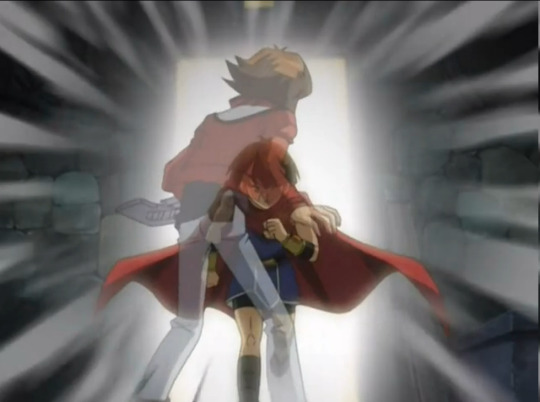
This is another missed opportunity, one that could have solidified the parallels neatly. But GX never asks that question, so the answer is unclear. What could have been a parallel is just kind of...askew.
Judai and Echo
Okay, I admit there isn't a lot here off the top of my head. Probably the best parallels between them are in relation to their other halves, as the people "harmed" by their villainous partners, and how they respond to that harm.
Judai rejects Yubel's torments as unwanted attention, until he remembers the past and flips to understanding why Yubel did they did and makes moves to unite the two of them forever. Echo, meanwhile, understands Amon's motives from start to end and...lets herself be sacrificed, the end.
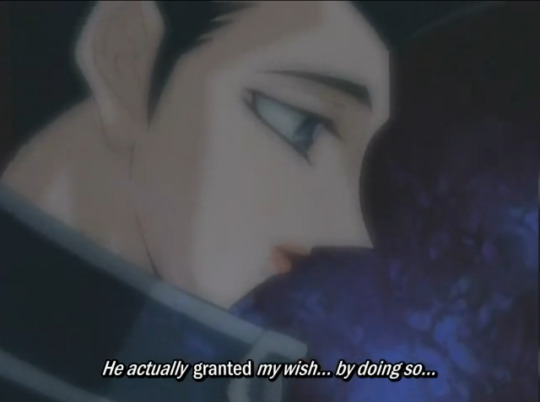
I don't know about this one. Really, ultimately Echo is supposed to be a willing participant in her own sacrifice but in the end I still don't feel like the narrative gave her a strong sense of agency in the matter and it really weakens my attempt to write this section.
In Conclusion
Some of these connections are stronger than others for sure, but I argue that they're all there in some way or another. They're very uneven and overall I'm not entirely sure what you're meant to take from the parallels, and I wish I could give something neat and concise for this section. Instead, it's a bit messy and misshapen - hence, the trapezoid metaphor.
Still, I think there's interesting room for thought in this awkward space. I was certainly thinking about these parallels while working on the latest chapter of Need (accidental last-minute plug?) and trying to figure out exactly what the prince felt while Yubel was in the middle of dragon surgery. What must it be like, to be in these relationships of sacrificial devotion?
#yugioh gx#yugioh series#judai yuki#yubel#amon garam#echo#essaying#meta#analysis#once again thanks to kaiowut99/GymLeaderLance99 for the subs#they're being used for a good cause?#anyway here's the product of me thinking too much about yu gi oh gx season 3#and all things yubel related#i am so on my bullshit
51 notes
·
View notes
Text
Psycho Analysis: Seto Kaiba
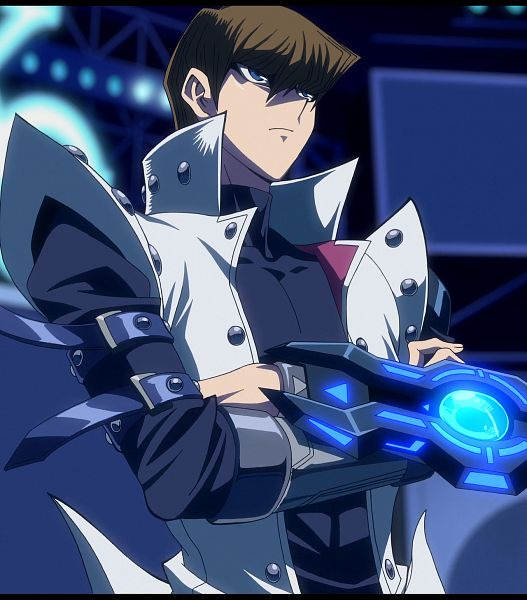
(WARNING! This analysis contains SPOILERS!)
Every good anime revolving around a game, sport, or competition needs a great rival to antagonize the main character. A rival is a character who helps push the protagonist to their limits, and forces them to apply what they’ve learned in order to beat them. Now, a rival like that typically isn’t someone who is going to get a Psycho Analysis, as most rivals are just garden-variety jerks at worst. For instance, Gary Oak is a bit of a snot, but he’s literally a child and he turns things around and becomes a decent guy relatively quick. Or hell, look at Miles Edgeworth; he spends most of the first Ace Attorney butting heads with Phoenix Wright in court, but he’s pretty quickly shown to be far more concerned with finding the absolute truth than any truly nefarious purpose. Ultimately, most rivals end up being genuinely decent people who just take competition a little too seriously and eventually develop into staunch friends and allies.
But imagine a rival who never changes. A rival dead set on being the most antagonistic douchebag possible, one who is driven solely by the sheer spite and hatred they feel at being second banana to someone else, someone who can’t bear that their massive ego is even slightly bruised. A rival who may help when the chips are on the table, but who is only doing so for their own selfish and self-centered reasons. That’s a character I could reasonably review on Psycho Analysis! And if ever there was a character who fits that bill, it’s Seto freaking Kaiba.
Now, to be clear here, Kaiba isn’t a villain. He’s an antagonist, he’s an anti-hero, but for about 99% of his screentime he’s not technically a villain. But just because the series is called Psycho Analysis doesn’t mean I’m literally only reviewng psychos, and it’s about time I broke out a bit and experimented in this new year by looking at characters who aren’t totally evil, but maybe are a little bit. And as you’ll soon see, no one is a better choice to break the mold than the second best duelist in Domino City.
Motivation/Goals: To put it simply, everything Kaiba does is motivated by his ego or by spite. This is a man who has done genuinely great things, from dismantling his father’s bloodthirsty legacy of profiting off of war to opening theme parks and creating new technology to make Duel Monsters more fun and engaging for all players. All of this on paper makes him look like the most ethical animated billionaire this side of Scrooge McDuck, but there’s one little issue: Nothing he does is out of the goodness of his heart.
Do you think Kaiba actually gives a shit about anyone affected by his father’s business? No, he just dismantled it out of sheer hatred for his adopted father who, to be fair, really was a massive cunt. Do you think he went through all the trouble to make massive strides in Duel Monsters technology just so people could have fun? No, he did it all so he could exploit it in some way to defeat Yugi once and for all.
And that’s one of the biggest things that drives Kaiba: His unquenchable desire to defeat Yugi and be crowned the true king of games. The thing is, every time they have a fair fight, Kaiba gets his ass handed to him; the one time he won was by essentially threatening Yugi with suicide. His sheer petty desire to one-up Yugi extends far into the future, where he names the loser dork house of the academy in GX after Yugi’s Egyptian God card Slifer, while the ultra-cool prestigious house is named after the God he got, Obelisk. And in one possible end of his story, he goes to the most insane and ultimate extreme to try and settle his grudge (but more on that shortly).
Performance: In English, there are two main voice actors of note who have portrayed Kaiba. The first is Eric Staurt, who outside of Kaiba is best known for his Pokemon roles of Brock and James. It leads to a bit of whiplash hearing someone who sounds so similar to the affable yet horny Brock be an absolute arrogant prick, but I definitely think Stuart is able to pull it off.
The other VA of note is Martin “Littlekuriboh” Billany, creator of Yu-Gi-Oh: The Abridged Series and the man who voices about 90% of that gag dub’s cast. His take on Kaiba is pretty much what happens if you cross Stuart’s performance with Solid Snake, and it works very well for a Kaiba who’s weirder and wackier yet somehow even more insanely egotistical.
Final Fate: Kaiba, seeing as he’s just a douchebag and not a truly evil person, doesn’t get any sort of major comeuppance save for constantly getting his ass handed to him by Yugi. There are really two possible endings for him, though if you want to be charitable they’re not necessarily mutually exclusive. The first ending is, of course, that he eventually goes on to found the Duel Academy, which means he helps kickstart the events of Yu-Gi-Oh GX in a way. Anyone even partly responsible for the rise of bisexual monsterfucker king Jaden Yuki is getting high marks in my book.
But the much more notable ending for Kaiba comes from Dark Side of Dimensions where, so consumed by his desire to duel Atem one more time despite the pharaoh finally being at rest, he leaves his company in the hands of Mokuba and goes to the fucking afterlife to challenge him. Whatever way you want to read it—that he actually used science to travel to the great beyond, that his tech killed him and he’s not coming back—Kaiba really cements his legacy as the most insane, obsessive rival ever created. If he still feels like he has something to prove by beating you, you ain’t getting your eternal rest; he will bust down the barriers of life and death to have a chance of whooping your ass. Absolute madman.
Evilness: So in this new segment, I’m going to establish how evil any given villain is and rate them on it, separate from how I rate them as a character overall. This score is basically just a reflection of how evil their actions are, with a 1 being “Barely a villain at all” and a 10 being a “Complete and utter monster.”
As we’ve already established a bit, Kaiba is more just an egotistical asshole than anything. In his early appearances in the manga you could definitely say Kaiba was a villain, and his first appearance as the starter villain of the anime definitely paint him as a dick… but after his mind crush, he definitely veers more into anti-hero territory for the rest of the series.
Normally, this would net him a solid 1, but that’s the thing. Despite the fact Kaiba frequently does genuinely good and helpful things and despite constantly aiding the heroes, he only ever does it because he feels like he has something to prove. For instance, look at his handling of the Big Five as he dismantled his father’s legacy; do you think he tore down the military dealings KaibaCorp dealt in out of the goodness of his heart? No, Kaiba did all that out of sheer hatred and spite, negative emotions that motivate just about everything he does no matter how nice it seems. Even if he isn’t actually evil by any stretch and even though he’s undoubtedly bettering the world with what he does, he’s doing it for impure reasons that mainly revolve around reasserting his own superiority. The only genuinely selfless things he does are for the benefit of his beloved brother Mokuba.
So for the first ever Evilness Score, I think Kaiba is going to score a 2/10, which denotes being a huge dick but not neccesarily evil. He’s not actually evil enough to warrant anything higher, but he’s too big of an asshole to get a 1.
Best Scene/Quote: Abridged!Kaiba gave the world “Screw the rules, I have money,” a line that perfectly summarizes a good chunk of Kaiba’s character in both the main and the abridged version of the show. But his best quote (and his very best scene) come during his duel with Ishizu in Battle City, where he decides to give fate the middle finger and beat Miss Ishtar despite her clairvoyance while giving her the following speech (in the dub):
“Hear me now! I won't be controlled! I decide my future! So now, I sacrifice my monsters! Obelisk and Gadget Solider, I send you to the card graveyard! You're so quiet, Ishizu. Where's your magic now? Or have you realized that there's no such thing as destiny? Now observe as I summon my Blue-Eyes! Show yourself!”
And more than anything, this sums up Kaiba: He has the most massive ego in history, the strength and cunning to back that ego up, and a steadfast and stubborn refusal of destiny. He plays by his own rules and follows his own path, and nothing will stand in his way. Not Egyptian gods, not prophecies, not magic or shadow games or what have you. He is unstoppable, implacable, and he won’t be denied that duel with Yugi no matter what anyone says. Not even the barrier of life and death can stop him.
Final Thoughts & Score: Unsurprisingly, as someone who grew up with Yu-Gi-Oh, I fucking love Kaiba.
Going into this, I knew he wasn’t going to be a straight example of a villain, because his evil is mostly relegated to the early parts of the manga and the start of the show, with his post-Mind Crush self being more of an anti-heroic jerkass with a heart of gold. But I think he’s just enough of an asshole to be worth talking about, and talking about antagonistic jerks opens the door to talk about characters like Toy Story’s Sid or the more hostile Pokemon rivals like Silver, Blue, and Bede here. It would have to be Kaiba blazing that trail, though; there’s no jerk more perfect to open the door to discussion of other jerks.
Kaiba is just genuinely fascinating in that, despite being incredibly static as a character, he never really feels shallow. Sure, he steadfastly refuses to change and never really becomes on the best terms with the Yugi squad, but his interactions with them are still fun to watch and he never gets flanderized to the point of being obnoxious. It’s honestly extremely impressive they were able to walk that tightrope of him never really progressing past being an asshole while still remaining a fun, likable character who it’s fun to see in action. I suppose it helps they gave him the most ludicrously badass backstory where he as a plucky little orphan boy manages to beat a businessman in chess to get adopted, fleeces him out of his entire fortune and company, and then dismantles said company’s military division to focus on gaming. And if that’s not enough, they have him do stuff like throw trading cards to jam guns!
Of course, his most appealing aspect is his single-minded obsession with defeating Yugi and proving himself as the superior duelist, a character trait for which there is quite simply no heterosexual explanation for (I’m half kidding). With most rivals, they don’t really get so consumed by their desire to defeat their opponent that they essentially kill themselves just to get another chance at beating them, but most rivals ain’t Kaiba! Really, I think the only rival I’ve seen who’s close to being on his level is Vegeta. Once again, they found a nice balance, keeping Kaiba from being too obnoxious even with his single-minded obsession with one-upping Yugi.
Kaiba is really a character who so easily could have been obnoxious or insufferable, but instead he quite honestly stole the show. Yes, Yugi and Atem’s trials and tribulations are crucial and all, but seeing the insane lengths Kaiba goes to ensure he gets another chance to summon his Blue-Eyes against Yugi’s Dark Magician is just a blast. You’re always wondering what insane rich guy nonsense the man is going to pull off next, and he rarely disappoints. Kaiba may not be evil, he may merely be an antagonistic rival, but I think he still deserves a 10/10 for being the egomaniacal asshole opponent every arch-rival should aspire to be.
51 notes
·
View notes
Text
Favorite Evil Doppelganger Villains
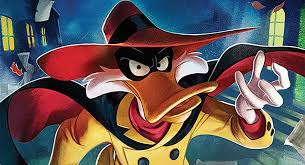
Negaduck - Of the "Evil Twin" variety, we have Negaduck from Darkwing Duck. Something of a parody of Reverse Flash, Negaduck cuts straight to the point of his trope by being pure, cartoonishly, over-the-top evil in a way that is both hilarious and genuinely menacing. This is mostly due to Jim Cummings' voicework, as the cold, snarling, raspy voice he gives the character can easily flip from lovably gleeful in his evil-doing to murderously serious on a dime. And I'm not kidding about the murder part: guns, chainsaws, flamethrowers, bombs, you name it...there's no weapon Negaduck won't brandish with lethal intent. Whether it be in Darkwing Duck, DuckTales (2017), or his new comic series, Negaduck is always a blast.
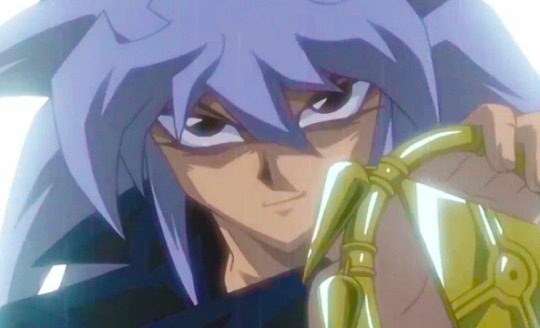
Yami Bakura - Of the "Superpowered Evil Side" variety, we have the Spirit of the Millennium Ring, aka Yami Bakura, from Yu-Gi-Oh!. Possessing the gentle, kind and soft-spoken Ryou Bakura is the exact opposite: the 3,000 year-old spirit of a brazen and psychotic but cunning tomb robber that has been assimilated into the soul of a demonic god. What makes Yami Bakura such a great villain isn't just how evil he is or how smart he is or the lengths he's willing to sink to in pursuit of his goals...it's just how long he is willing to play the game. It takes 230 chapters (manga) and 188 episodes (anime) between his introduction and the final story arc for Yami Bakura to have everything he needs to set his master plan in motion, but he is patient enough to wait that long, and the pay-off is more than worth it. Add to that stellar voice-acting from both Rica Matsumoto and Ted Lewis, and you have a villain to remember.
#Disney#Darkwing Duck#Yu-Gi-Oh!#Negaduck#Yami Bakura#Evil#Villains#Opinion#Analysis#My All-Time Favorite Villains
30 notes
·
View notes
Text
We've got shadow games, shadow selves, and not a shadow of a doubt that this pairing was like cheese and fine wine. Duck dives deep into Yu-Gi-Oh lore to confirm what we always suspected: this show is weird.
#yugioh#yu-gi-oh#kazuki takahashi#meta#analysis#podcasts#jungian#jungian analysis#anime#yu-gi-oh season zero#yugioh season zero#Spotify
8 notes
·
View notes
Text
youtube
New video just went up on the YouTube channel, in which I do a deep-dive into the character of one of my all-time favorite Yu-Gi-Oh characters, and honestly one of the most compelling and tragic villains in Yu-Gi-Oh's rogues' gallery, the one and only Yubel from Yu-Gi-Oh GX!
Reblogs are greatly appreciated!
#super nerd daniel#yugioh#yu-gi-oh#yugioh gx#yu-gi-oh gx#yubel#youtube#youtuber#youtubers#video#video post#character analysis#character breakdown#Youtube
25 notes
·
View notes
Text
Ep 44 Pt 2: Name Hunt
We start this half of the episode at the card game that is currently just kinda stalled. It’s more like a D+D session at this point, where everyone is separated, random enemies are appearing in random rooms, and their biggest issue is that they were balanced to work as a team, and as a solo fight they’re gonna freakin die.
Or Bjork will come back in the time it takes for the team to reassemble.
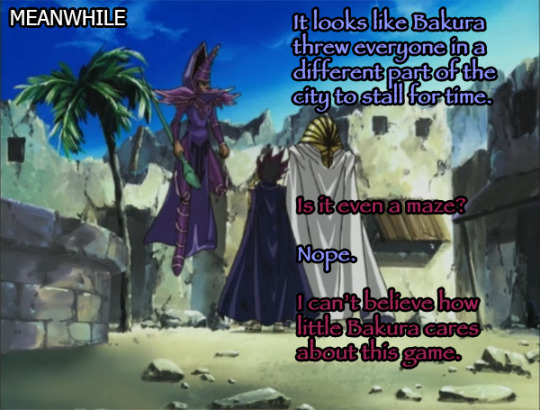
Sorry his name isn’t Bjork, it’s Korn. Or...well it’s something from the 90′s. Zork. It was Zork. But with a c. Bjorc Necrophades.
So as Yami dumps on Bakura about how boring this game is for him, Bakura reminds him that because Pharaoh shoved his memory in a puzzle piece, Pharaoh is dumb as a sack of bricks. Which like, relatable.
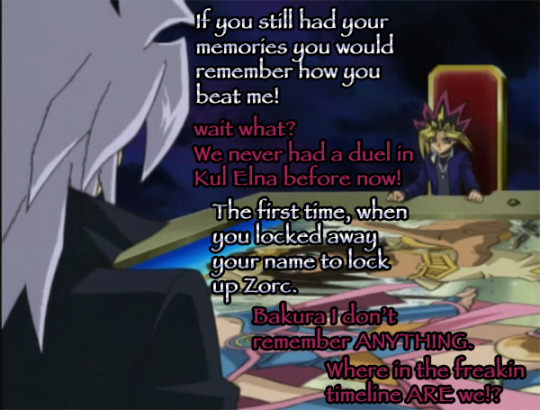
I STILL don’t quite get it.
I know that Seto kills Yami in the OG timeline, they have been saying that for 4 seasons. But if Yami had to put himself in that puzzle to put back Zorc...does this imply that the fight with Seto was to resurrect Zorc? that Seto was a pawn of Bakura even in the original timeline?
Wait is that it?
(read more under the cut)
Have I finally figured out the paradox that’s been bothering me all season, where before it looked like Yami died 2 separate ways in two separate timelines? I mean, while I am much better (not fully, hence the slow update schedule but am getting much better) Long covid for like an entire year removed so much of my memory, that I was able to play Undertale again like it was the first time. Which is incredible because it’s the most memed game and y’all, I forgot nearly every line that Sans said. Which I’m not gonna lie, kind of rocks. But also kind of difficult when I’m trying to remember the plot of this show.
Bro did offer to write the blog in my stead, but when he attempted to use Photoshop he could not figure out how to leave the text editor. Making these caps will one hundred percent crash my computer if he’s doing the driving. Photoshop crashes my computer about 4 times on a normal day, if you don’t know what you’re doing, Photoshop will seal you in a demon dimension before crashing your computer, and yet, still charge you 12 dollars a month. You cannot turn your back on photoshop, just like Zorc.
Anyway, back to the show:

I mean that’s my personal gamble. I will always gamble Tristan on who’s gonna die. And him being Bakura right now is just...ooo ripe to die this season, yeah?
Bakura took a moment to try and remind Yami that this is all a simulation and all of these pieces on the board were in fact not real people, to which Yami reminded Bakura that he himself is a ghost in a box and is only loosely defined as a “real person” himself.
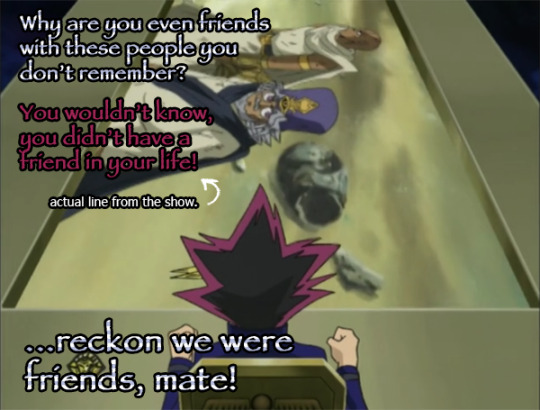
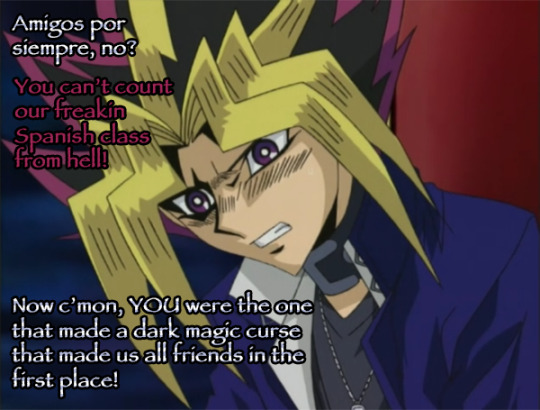

👁👄👁
And then Karim, who’s name I had completely forgotten, so I’m glad the show reminded me, was like “Oh no! I’m dying!” PS he’s been “dying” for like 3 episodes, so I was very surprised he actually fully died.
Like Egypt Grandpa is going to outlast this stack of bricks down there, and that’s like a lot to take in. Modern Grandpa breaks his butt like constantly but Egyptian Grandpa is built like a truck.
Isis was very upset by this, and like I don’t blame her, look at the FEATURES on that man. True tragedy right there to lose that block of cheese right there and just be left with freakin Shada. Who, in case you forgot, has a motorcycle tattoo on his entire forehead. I too would be crying my eyes out, Isis, this is looking grim for you.

It only just now as I was writing this cap realized that when Bakura was like “who would you bet is going to die first?” he wasn’t talking about Yami’s high school friends, but was in fact foreshadowing the truly tragic death of Karim, who I totally remembered the name of.
Anyway, it’s still gonna be Tristan because for real, Karim doesn’t count.

Bit of a baby manger vibe to this shot, not gonna lie. Nice nativity we got going there. Baby jesus, Mary and Joseph, a shepherd, a wise man, and uh...Shadi. Shadi could be an Angel I guess, he isn’t technically alive. There. Print this out and put it above your grandma’s Christmas tree, instant nativity.
Speaking of the kids, Joey was really testing my gamble by walking headfirst into a trap that spits daggers into your feet.
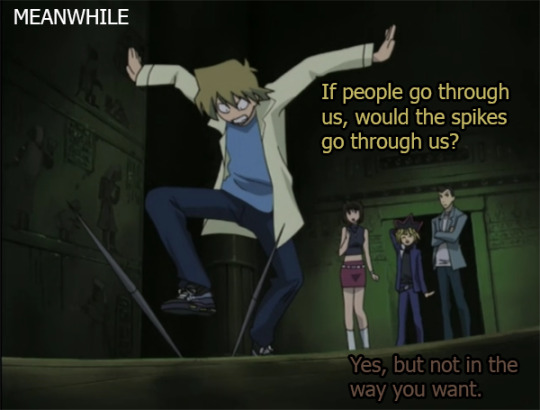
Inside of this maze is step by step the same as the story of the tomb we saw with the hot version of grandpa that opened this arc.
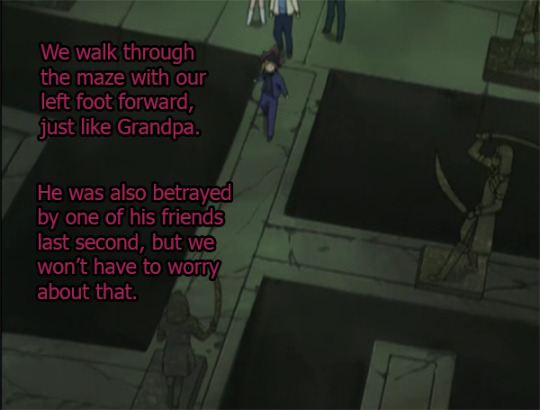
Including this room, where Grandpa got betrayed by a very silly slingshot.
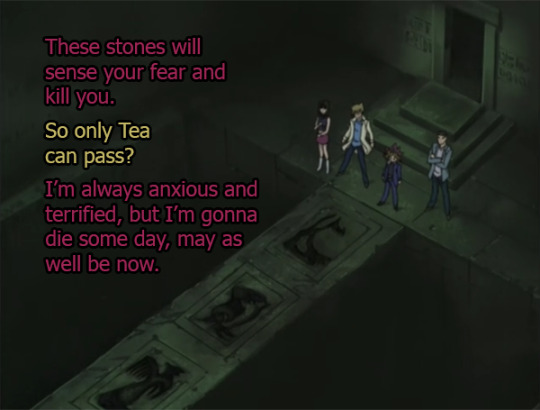
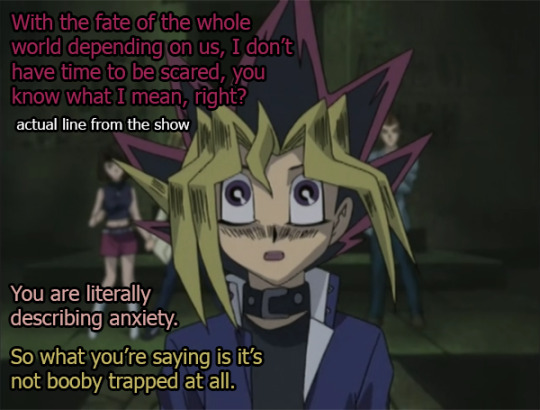
This was the show spoon feeding us Yugi’s character growth, since he was just a barrel of nerves and sinew when we first met this boy. He is braver this season, I will give him that, but it feels like it’s more that he’s the only person who’s fully aware that none of this is real. Yugi is inside of his own mind puzzle. It’s literally the only place he’s got full control (ish).
At the end of this little walk across the fear pit that literally no one here had any problems with (like Tea walked across this narrow fear pit in 5 inch heels!) The little box that carried Pharaoh’s puzzle isn’t here, instead it’s a bunch of Egyptian hieroglyphs.
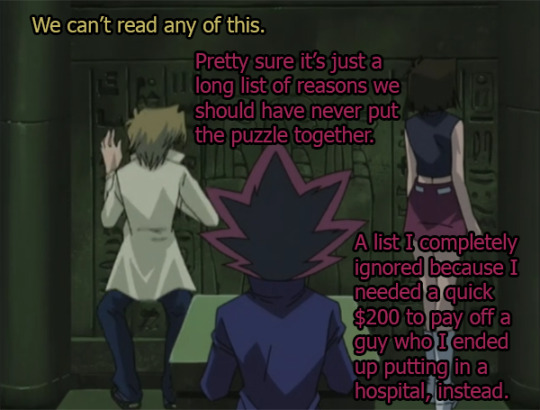
Reminder that even Season Zero Yugi, who is the most pile of nerves Yugi, would have kicked your ass even without the puzzle. Like this is mostly my own interpretation, but without the puzzle......Yugi would have straight up stabbed that guy, right? Like straight up? Yugi is a menace to society. Sure, he was nervous about having to defend himself, but Yami wasn’t a Pharaoh yet, he was Yugi’s dark side, who was backed into corners so hard by people with literal whips and people with yoyo’s with spikes on the end, he pretty much always had to choose violence in order to survive Freshman year.
Like yes he walked across a bridge without fear. Makes sense, the bridge doesn’t have spike yoyo’s, fire shooting out, a guy holding your girlfriend hostage with a gun at a burger restaurant, and whatever capitalist nightmare Seto has come up with that month. But we can still call this bridge character development, as a treat.

After Joey tricked the switch that opened the garage door to Yami’s secret name, the episode ended.

can’t wait to see Tristan hold up some fingers and have the show convince me it’s a gun.
Anyway, here’s a link to read these from the start, which I keep giving you although I need to reread my own blog myself, haha.
https://steve0discusses.tumblr.com/tagged/yugioh/chrono
#Yugioh#Yu-Gi-Oh#YGO#Analysis#screencap#watchwithme#Episode recap#Yugi Muto#Joey Wheeler#Tristan Taylor#Yami Muto#Bakura#Theif King Bakura#Tea Gardner#S5#Ep 44
24 notes
·
View notes
Text
Sherry Leblanc - @tophatz

She looked away, embarrassed at herself. It wasn't like her to hold a grudge, and after everything they went through, she ought to at least give Leblanc the benefit of the doubt. Hadn't there once been a time she was willing to forgive people without hesitation? Trudge, of course. Barbara. Malcolm and Ramon-- although she was too young to know what damages they were causing at the time. Even Sayer. She hadn't fully forgiven him, but she did risk her life to save him. And maybe even succeeded, which made things worse for everyone.
Somehow, she lost sight of that forgiveness after Goodwin's actions, though. She became a lot colder to anyone who spoke to her. In hindsight, a lot of the friends she and Yusei made had been people who opposed them at first, and ultimately accepted a hand of friendship. Sherry was no different, yet something still put Sylvia on edge around the woman.
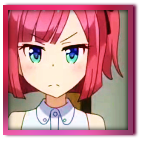
"Sorry," she finally said, curt and short in her response. "Ignore me. I'm tense." She extended her hand for a handshake. "Sylvia Reviar. Team Shining Storm. Toru and Yusei's sister."
#🌸 ~ in character ~ 🌸#🌸 ~ Yu-Gi-Oh! 5D's verse ~ 🌸#🌸 ~ Sherry Leblanc (tophatz) ~ 🌸#sylv: beginning analysis. Threat level to be determined#i'm so sorry sherry lmaooo
3 notes
·
View notes
Text

He’s so proud of his cards.
Tango, season 9 episode 35
[ID: a minecraft screenshot from the hermitcraft 9 server, taken in the artificial cavern around Decked Out. Tango is standing in the centre of the image, looking slightly up, directly at the viewer. He’s in his deep frost skin, no hood, and he’s wearing an enchanted elytra. He’s holding a torch. There’s a quartz wall behind Tango, and on that quartz wall there’s 30 glow item frames across 2 rows. 29 of those item frames have cards in them for Decked Out. I believe they’re made to mimic a combination of Magic: The Gathering and Yu-Gi-Oh! cards. End ID]
#the reviews on the cards are… mixed#but thats not my job to report on ^-^#tango tek#tango but everywhere#hermitcraft#tangotek#hc9#also take my card design analysis with a grain of salt#i havent played magic or yu gi oh#it just felt familiar to me so i did a bit of a google around#the theming and art style of the cards reminds me of magic more#but the whole ‘art takes up majority of the card’ is more yu gi oh#or even pokemon energy cards but theyve got more of a sleek modern feel to them compared to magic’s medieval style#idk
40 notes
·
View notes
Note
What do you think about Diabellstarr so far
I've got a few thoughts! I'll share them under a readmore. For reference to the uninitiated, Diabellstar the Black Witch is a Yu-Gi-Oh! card. It's powerful, new, expensive, and supposedly is going to kick off a new Yu-Gi-Oh! storyline, exclusively told through card art. (This has happened a few times before, though most recently, with the Albaz and Visas Starfrost storylines, they've taken about three years to complete.) It looks like this one is going to be following an outlaw on the hunt for treasure, and is the first girl MC that I've seen from a recent card storyline.
First, a quick overview of who Diabellstarr is, and what she does.
Diabellstar the Black Witch is a 2500/2000 7-star monster, with the effect below.
You can Special Summon this card (from your hand) by sending 1 card from your hand or field to the GY. You can only Special Summon "Diabellstar the Black Witch" once per turn this way. You can only use each of the following effects of "Diabellstar the Black Witch" once per turn. If this card is Normal or Special Summoned: You can Set 1 "Sinful Spoils" Spell/Trap directly from your Deck. During your opponent's turn, if this card is sent from its owner's hand or field to the GY: You can send 1 card from your hand or field to the GY, and if you do, Special Summon this card.
So, in a vacuum, without knowing what the 'Sinful Spoils' cards, are-- Not a bad monster. A free level 7 body, 100 ATK higher than Kashtira Fenrir, with an ability to come back to the board, and plus on summon. An important distinction about this effect, though, is the 'sending' from hand or field to the graveyard isn't cost. For her first effect, it's part of the summoning condition, meaning it can't be interrupted, and for her second effect, there's no semi-colon. This just means you won't be caught in a situation where you go negative to bring her out, only to get stopped. Not bad, but we really need to know what those 'Sinful Spoils' cards do, to make any value judgement. Let's take a look, shall we?
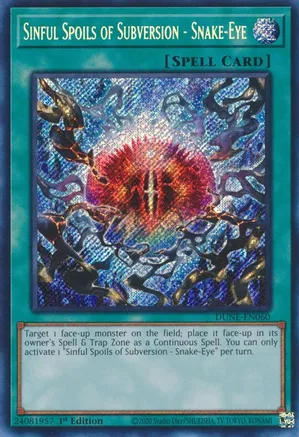
Sinful Spoils of Subversion - Snake-Eye is a normal spell card, with the following text.
Target 1 face-up monster on the field; place it face-up in its owner's Spell & Trap Zone as a Continuous Spell. You can only activate 1 "Sinful Spoils of Subversion - Snake-Eye" per turn.
This card has only one effect, and it's... Interesting. At first blush, it's a unique form of removal that most cards can't deal with -- Being placed in the Spell & Trap Zone isn't traditional removal, and only unaffected or untargetable cards could hope to dodge it, but it feels like there's probably better targets than this. Still -- Maybe a one-of, or a side-board option to have to deal with tricky decks you can't out.
Lore-wise, this appears to be what Diabellstar is after, the gem that is able to control other monsters to fight Diabellstar, and the object she either wants, or wants to destroy.

WANTED: Seeker of Sinful Spoils is a quick-play spell card, with the below effect.
Add 1 "Diabellstar" monster from your Deck or GY to your hand. During your Main Phase: You can banish this card from your GY, then target 1 of your "Sinful Spoils" Spells/Traps that is banished or in your GY, except "WANTED: Seeker of Sinful Spoils"; place it on the bottom of the Deck, then draw 1 card. You can only use each effect of "WANTED: Seeker of Sinful Spoils" once per turn.
So, off the bat -- We're not going to be able to activate this card the same turn we set it with Diabellstar's effect, which is a big hit. Especially with the effect that we can see -- It's just an add. Not bad by any means, but it means you're going to want to see this in the opening grip to kickstart your plays, and not set it off Diabellstar's effect. Still, a free Reinforcement of the Army for an archetype is nothing to shake a stick at, especially with the second effect -- Recursion and a free draw is a great effect for a spell card to have, especially when it pluses you with its first effect anyways.
Lore-wise, I love this card. It's Diabellstar's wanted poster! There's even a line in the Age of Overlord Set intro where the announcer talks about how she'd like to lay-low in your deck for a little bit, if that's okay. Super cute.

Sinful Spoils of Doom - Rcilea is a quick play spell card, with the following effect.
Target 1 Level 7 or higher Spellcaster monster you control; apply the following effects.
● While face-up, that monster is unaffected by other monsters' effects this turn, and is sent to the GY during the Standby Phase of the next turn.
● All monsters your opponent currently controls lose ATK equal to the targeted monster's ATK, then if their ATK becomes 0 by this effect, destroy them.
You can only activate 1 "Sinful Spoils of Doom - Rciela" per turn.
So, we're getting a card with two effects, with a once per turn activation. Keep in mind, cards that negate activations will allow this card to be played again, assuming you have another copy. The cost to target a level 7 or higher Spellcaster monster... Does in fact synergize with Dark Magician, yes, but it's obvious this is intended for use with Diabellstar. The first effect is... Okay? But has some inherent non-synergy with the fact that Diabellstar hitting the graveyard is actually okay, with her built-in-recursion effect, and there's nothing specific about her that makes her great, or worthwhile to keep around on the opponents turn. The second effect, however -- Not... Great, but not terrible. Because it's an attack-modifying effect, I believe it can trigger in the damage step, and if it's not set off of the effect of Diabellstar, (IE not known by your opponent), then it could be a semi-valuable series of pops for your opponents monsters. I could see this being a play.
Lore wise... I'm not sure what's going on here. It looks like Diabellstar has huge ass wings, and she's getting ready to fight a... Miasma of some sorts. Good for her. #girlwin.
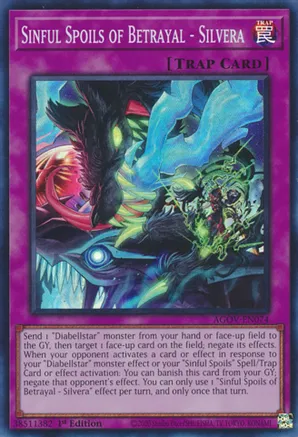
Sinful Spoils of Betrayal - Silvera is a normal trap card with the following effect.
Send 1 "Diabellstar" monster from your hand or face-up field to the GY, then target 1 face-up card on the field; negate its effects. When your opponent activates a card or effect in response to your "Diabellstar" monster effect or your "Sinful Spoils" Spell/Trap Card or effect activation: You can banish this card from your GY; negate that opponent's effect. You can only use 1 "Sinful Spoils of Betrayal - Silvera" effect per turn, and only once that turn.
First things first - It's a trap card. Those are generally not great, even archetypal ones that plus you to infinity. Still, let's give it a look. The cost to send from face-up field... Sucks. It has non-synergy with the last card, and dies to a book of moon before you're ready to use the rest of the effect, but the fact it does send from hand means it synergizes with the WANTED at least. A targeted negate is pretty good, especially as an omni-negate. The second negate is even better -- Finding a way to cheat this into the graveyard, just to use the second negate, actually would be pretty good. This card, I'd argue, would border on playable if not for the strict hard-once-per-turn condition at the end.
Lore-wise, this kind of gives some light to what's going on in the previous card -- It looks like Diabellstar can use her effects to control that... Other dragon, to attack the blue dragon controlled by snake-eye. Cool!
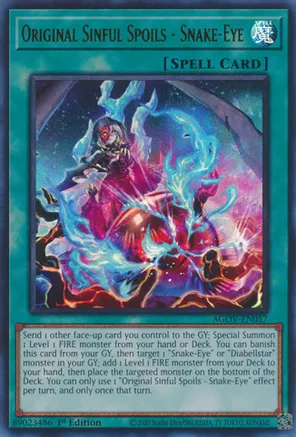
Original Sinful Spoils - Snake-Eye is a normal spell card, with the below effect.
Send 1 other face-up card you control to the GY; Special Summon 1 Level 1 FIRE monster from your hand or Deck. You can banish this card from your GY, then target 1 "Snake-Eye" or "Diabellstar" monster in your GY; add 1 Level 1 FIRE monster from your Deck to your hand, then place the targeted monster on the bottom of the Deck. You can only use 1 "Original Sinful Spoils - Snake-Eye" effect per turn, and only once that turn.
So, with the first effect -- The cost is a bit steep. Requiring a face-up card likely means it'll be a monster, turn one, and can't be activated under shifter. Remember, though -- Because Diabellstar can set any sinful spoils card from deck to field, this is a good candidate. Since it's a spell card, it can be activated this turn, and we're already going to have a Diabellstar face up on our field to send, so that cost isn't too much. Now, factoring in the effect... Special summoning any level 1 FIRE from hand or deck. Wow. That's pretty good -- Notable level 1 fires include Jet Synchron, which will give you repeatable access to tuners for synchro summoning, a few monsters to support the Infernoble Knight archetype, and Rescue Ace - Fire Hydrant, to start any R-ACE plays. Considering the Diabellstar -> Snake-Eye -> LVL1 Fire combo only costs a single discard, and can start your plays off without falling prey to Droll & Lock Bird... Pretty good! Now let's read that second effect. Pretty good recursion, balanced out by the hard once per turn clause at the bottom -- It just means unless this card gets removed from the grave, you're likely going to be able to get another Level 1 FIRE monster on your next turn, as well as resetting your Diabellstar for the following turn as well.
Lore-wise, it looks like this card shows Diabellstar... Seemingly winning! Using her cool ass dragon and powers to kill the snake eye dead, and hopefully gain its power? All and all, an interesting set of cards, from a lore perspective.
~
We've got one more aspect to cover though, and it's not very fun. WANTED: Seeker of Sinful Spoils came out as a secret rare in AGOV, and Original Sinful Spoils - Snake Eye, came as an ultra rare in the same set. These look like the two best Sinful Spoils cards. The former is $80, the latter is $4, and Diabellstar is $20 (coming out in AGOV also as a secret rare), which means... A playset will easily get you into the $300 range. Ouch. This is a part of yugioh I'm not a huge fan of. While it's nice that the... Worse cards are all less than a dollar, and there is another printing of those three cards... They're all 25th century rares, which are much more expensive.
Which, obviously, sucks! The fact they're level-one-fire support, as mentioned before, can help synchro archetypes, rescue-ace, and infernoble knight, all three are very competitively viable! It also very much feels like we're gonna be seeing a sinful spoil level 1 fire monster in the future, and kidna guessing at what is gonna come up next is super neat. I'm also clearly a big fan of women, and I hope Konami pulls a dogmatika with her, and not an ice barrier :3
So, in conclusion -- I like Diabellstar! It interacts with the game in a very interesting way, it has some clear setup for a cool storyline in the future, and also has some neat gameplay loops. It feels balanced, it feels interesting... I just wish it was cheaper :)
#yugioh#yu-gi-oh!#tagging it as both cause idk which ill use in the future#i dont usually tag stuff but ill probably do so for big posts like these in the future.#if you like this#or wanna see more card analysis or anything... let me know! I had a surprising amount of fun with it#long post#ask#answer
4 notes
·
View notes
Text
TDLR; Why Seigfried Didn’t Work As A Kaiba Expy, He Wasn’t Neurodivergent
Hi everyone! While I’m writing the next chapter and trying to survive Capitalism despite living its real-time collapse (I work two jobs, why chapter production is slow these days), I’d like to make a post like this while it’s still Autism Awareness month.
Now, not to say you can’t enjoy the pink haired frilly goofy man. I never have though. I felt like he was a let down after Dartz, who is my favorite villain of Yugioh, I SAID WHAT I SAID. And I’m also saying you can enjoy your villains of Yugioh, and I will enjoy mine.
All that out of the way, I would like to dive into an analysis of Seto Kaiba and who I felt were his good expies, Noa/Noah and Alister/Amelda. Anyone who has autism (myself included, I’m not 100% on paper yet but I’ve had multiple doctors agree with me), you know. There’s a Neurodivergence ESP, when you are talking to someone you just Know when someone else just isn’t neurotypical
This is based off of their canon, observable in the show behaviors, trying not to lean into anything headcanon unless it slightly grays the area a little. Using dub names but will tag original names later (I just don’t like Amelda as a name...)
But first starting with Seto himself, he’s very blunt and impulsive. Which isn’t helped by the fact he’s got a lot of money. So he can act on literally every impulsive thought he has. Man probably filmed that idea to send Duel Monsters cards into space the minute he had it in GX.
He’s very egocentric, which a lot of people get confused with his arrogance. Not that he’s not both, but he really genuinely believes that any time his company is under attack, it’s because someone’s trying to take it over. Not that it’s the one sure-fire way to draw him out of hiding, it’s that everyone is out to get him. Always! (as an example, during Season Four his company gets bought out by the villains. He’s convinced this was ALL a ploy to take it over, when really Dartz needs him out in the open because he needs to kill him.)
His special interest is Duel Monsters. Literally all his money comes from making electronics and technology specifically for playing his special interest. And he’s richer THAN the person he pays royalties to because Seto doesn’t own Duel Monsters. Pegasus does. All Seto did was invent the technology to play it, and fixing the rules to actually make the game playable (The rules of Battle City were his, after all.)
He’s pretty close to being nonverbal, a LOT of Kaiba’s lines are actually thoughts in his head rather than stuff he says out loud, except when he’s delivering snarky comments or talking to Mokuba.
He’s got a perpetually weird relationship with the protagonists because he’s not good with social cues or interacting with people in general. Not that he wouldn’t die for them, he’s not good at expressing it though. They’re his friends, but they gotta squint to hear what he’s actually saying.
-----
Noah’s is going to be a lot shorter as far as canon behaviors go since we only have a few episodes with him really, and I’d also think of him as having both BPD and autism (which happens co morbidly, around 15% of BPD patients also meet the criteria for having ASD.) (There’s also that they all have some very intense levels of PTSD, but that’s another kettle of horses.)
His biggest sign that he’s both is his emotional state of being when we encounter him in his half of Season Three. Not to say that his environment didn’t help him any, but I think it’d just made it more obvious. Both conditions affect mood stability, which cause intense emotions and a grandiose sense of self at the same time. But there’s also a sense of emptiness and a negative impact on self esteem, a diffuse of self (in TVTropes words, he definitely has a Superiority-Inferiority Complex.)
Much like Seto, as well, social cues aren’t something he excels in. The idea of anyone being nice to him is confusing, but he really develops one bond (Mokuba), and he convinces himself he needs to die for him and the people he brought into the Digital World. But a few scenes before he steals Mokuba’s body briefly, he can’t comprehend why someone is being nice to him.
He thinks he’s being slow and steady with the reveal he’s about to drop on the protagonists of being Gozoboro’s son, but remember that his entire arc is only a few hours of one day in Battle City (when they cut to Yami Marik being like ‘.... Where the hell did everyone go?’), so they’re not really there long before he starts traumadumping and infodumping about his own monsters. He’s so socially deprived that he’s A) going to tell you all what he’s been through because all he wanted was to be loved by someone who couldn’t possibly love him, and B) He’s going to tell you about his niche interest in computer programming to make the world he’s in more interesting, as well as the extremely niche tidbits of information he has about Spirit Monsters and their development in the game of DM.
(Remember, the Deck Master system and the rules of their abilities is the stuff he made up. Pegasus still made the Spirit Monsters, don’t let the rules of the Season throw you. They’re using a database of every known card, they’re in a computer, and it doesn’t trip up the rule of Season Four of the Orichalcos. Because it’s being used by one specific cult and no one else.
The cards in Noah’s deck, broken effects and all, actually existed in-universe, and given how all of the protagonists had never heard of them until the duel with Noah, despite Solomon owning a Card Shop and there being more in Domino, that means he was into the REALLY obscure cards of the game.)
----
Alister is probably the most neurodivergent of them all, to start he has a very one-track mind ability to hyperfocus. The only thing on his mind ever is getting revenge on Seto Kaiba because he’s the living body still. If Alister COULD kill Gozoboro still, he would. Unquestioningly.
He’s got a very strong sense of justice powered by a black-and-white morality way of thinking. He is definitely someone you want in your cult to destroy the world, it takes very little convincing that someone is evil and needs to be destroyed. And he can’t be swayed from his opinions, either. He’s got very intense feelings that are being taken advantage of. He’s got a very declarative memory and trauma dumps with very little prompting.
He’s got a comfort item that ties into his traumas, of course.
He’s got some odd reactions too and is strangely very naive despite everything (aside from the normal response of ‘Who are you?’, doesn’t seem to question that he’s straight up hallucinating/receiving a mental link directly to Dartz the first time they ever speak. Not a ‘what the hell is going on, what is happening, where did the world go’, ect, ect. Just ‘This person can tell me what happened and who hurt me? Okay.’ )
Alister’s also got issues with social situations, the only friends he has you can count on one hand. And that comes with its own weird rules of That’s Just How They Talk To Each Other. (He does love Raphael and Valon, even saying that he and his ‘new family’ are saving the world.)
Also, this one is semi-canon, semi- head canon, hence the disclaimer earlier. He’s got sensory issues and is sensitive to light (he wears sunglasses inside of buildings, and during the nighttime.) And his clothing, at least to me, suggest he gets hot easily but still needs pressure due to an aversion to touch. (His shirt is midriff exposing, but he also has like eight belts and a huge ass trench coat on. And heat intolerance is a littler-known sign of autism)
----
I never got anything that deep out of Seigfried. He really just that butthurt about his company. While my story doesn’t go past Season Four, I know how I’d fix Season Five.
#my thoughts#My writing#yugioh#Yu-Gi-Oh#yugioh dm#Yu-Gi-Oh!#Duel Monsters#autism awarness month#Autism analysis#seto kaiba#kaiba#noa kaiba#noah kaiba#alister#amelda
11 notes
·
View notes
Text
Analysis - 4Kids And An Enhancement They Added To Yugi and Mai's Duel
When it comes to 4Kids, some of their decisions and choices have been mocked for several a right reason, such as forcibly trying to Americanize certain things and being too afraid to step on parent's toes by bowderlizing many things (though some is understandable even if I may not agree with it, given how moral guardians can act). But sometimes, 4Kids did try to polish the story so that things could flow even just a little bit better. And one such case would be Yugi and Mai's duel in the Duelist Kingdom finals.
In the field between the two, Mai is able to grasp a significant lead on Yugi/Atem due to him not playing at his best, but the reasons for that differ in the languages. In the original Japanese version, Atem basically allows Mai to gain such a lead because he doesn't take her seriously and is focusing on fighting Pegasus. Now, that doesn't sound very much in character for Atem, given how he takes every opponent he goes up against, even when the stakes don't involve high-risk magical shenanigans, seriously and doesn't underestimate them even for a millisecond. And keep in mind, Mai won at least 15 Star Chips (5 extra to pay Yugi back for his kindness) from duelists that Pegasus deemed worthy enough to grant an invite to. And for those of you who don't know (however few it may be), this alarmingly out of character moment also occurs in the manga, which is rather startling. So, what does 4Kids do?
4Kids manages to have the reason for Yugi and Atem's poor performance early in the Duel have to do with a distracted Yugi and fully tying up a mini-arc from when he had his rematch with Kaiba, and lost when Yugi chose to call off his attack with Celtic Guardian when Kaiba pulled out his ultimate Trap Card, Castle Battlement Ledge, with the Pharaoh all too willing to win even knowing that Kaiba would likely end up hurt. When Mai tried to give him Star Chips to replace the ones he lost to Kaiba, he's still too shaken to respond to her and Téa picks up the slack for him, winning them in a duel against Mai. Now, you think that would be the end of it? Not quite. What follows after that but before the Duelist Kingdom finals tears open that barely healed wound. The event in question being Pegasus defeating Kaiba and stealing his soul and the subsequent nightmare Yugi has of Pegasus' captives on monoliths and Yugi's grandpa telling him to use the Millennium Puzzle's power to counteract Pegasus' Millennium Eye.
Yugi's able to put on a brave face and have the Pharaoh duel, but it's clear that what happened isn't just something that would go away in one episode. Subsequently, Yugi wants to get the Duel over with before he thinks Atem gets any ideas about trying to use the Puzzle's power to hurt Mai (remember that in the anime, Atem managed to swap the places of Bakura and Yami Bakura's souls so that they didn't run the risk of sending their good friend to the graveyard). As a result he tries to keep Atem on a short leash and refuses to have him try and work with him, thinking that outmuscling Mai will get the duel finished with faster. Which ends up to their detriment. But it does get resolved, with Mai's help.
Mai still retains her abrasiveness in the 4Kids dub, but the dub also remembers her character development and her desiring a fair fight and win against Yugi. She can tell that he's still hurting, and in her own caring, but rough way, tries to help him get back on track by forcing him to confront the problem, pointing out how Joey taught her to confront her issues head on and to trust in her herself and her own abilities. This in turn finally allows Yugi and Atem to conclude their mini-arc, the former finally choosing to fully trust in the latter again. Atem even apologizes for going against Yugi's wishes of not wanting to win even if it meant hurting someone. As a result of their resolution, they are eventually able to triumph over Mai.
In a case of understated brilliance, 4Kids' dub doesn't add a plot hole but undoes a startlingly out of character moment from Atem done for forced drama. And ultimately, uses these changes to put an end to a mini-arc of Yugi's character development in a satisfactory way. And all without making anyone out of character.
*EDIT: fixed some spelling errors.
25 notes
·
View notes
Note
Okay this question was probably asked before, but DO YOU HAVE ANY RYOU (BAKURA) HEADCANONS???🙏✨

I'm so sorry for taking forever to answer this ask, OP!
Truth be told, I'm pretty terrible when it comes to consistent headcanons for any given characters - whenever I write them, I tend to have them fit whatever genre, tone, situation, etc. the story dictates, if that makes sense :D
THAT SAID, for Ryou specifically - in addition to all the very-valid "boi loves his occultism" headcanons that the YGO community has manifested - I can't help thinking he'd be a bit more worldly than Yugi and co, if only because we know he at least traveled to Egypt with his father where canon shenanigans occurred. So, it's not too far a stretch to think he'd have traveled to and / or lived in other foreign places, especially once his mother and Amane passed away.
He'd probably have picked up languages, different tastes in food, etc. that might make him a bit more "global" than his peers, which could explain why he doesn't quite fit in as a typical Japanese schoolboy. Him traveling and living abroad so much might also explain why he's so damn polite, because once he's moved to Domino he's actively trying to fit into this culture that he's been away from for so long while also doing his darnedest to not necessarily stand out.
Anyway, that's my one big headcanon for Ryou specifically - not sure if it's what you were looking for, OP, but I def appreciate the ask :)
13 notes
·
View notes
Video
youtube
Avec bien des mois de retard par rapport à ce que j’espérais, sort enfin l’analyse de Judai Yuki, protagoniste de la série Yu-Gi-Oh! GX !
#yu gi oh gx#yu gi oh! GX#yu-gi-oh! GX#judai yuki#yuki judai#Juudai Yuuki#yuuki judai#analyse#french#analysis#video
11 notes
·
View notes
Video
youtube
Kaiba Will NEVER be KING
#youtube#YuGiOh#Yu-Gi-Oh#Yu-Gi-Oh!#Kaiba#SetoKaiba#Seto Kaiba#Character Analysis#CharacterAnalysis#Yugi#YugiMutou#Yugi Mutou#Atem#Pharaoh#Manga#Anime#King#Duel King#King of Kings#King of Games#King of Duelists
5 notes
·
View notes